 31/07/2009 15:05 31/07/2009 15:05 |
|
| | | OFFLINE | | Post: 18.064
Post: 724 | Registrato il: 28/08/2005
Registrato il: 20/01/2009 | Administratore | Utente Senior | |
|


July 31
 St. Ignacio Lopez de Loyola (b. Spain 1491 - d. Rome 1556)
St. Ignacio Lopez de Loyola (b. Spain 1491 - d. Rome 1556)
Knight, Hermit, Mystic
Founder of the Society of Jesus (1534)
OR today.
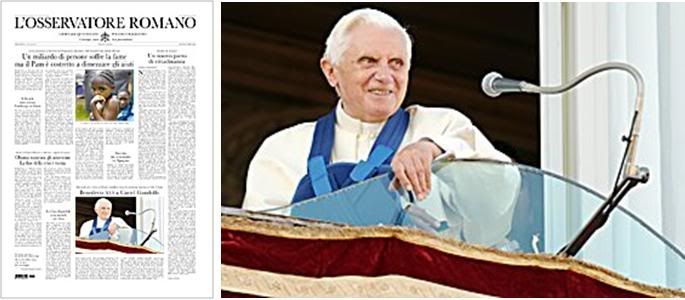 On Page 1, the OR reports on the Pope's arrival Tuesday in Castel Gandolfo; and a commentary by the Mayor of Turin on
On Page 1, the OR reports on the Pope's arrival Tuesday in Castel Gandolfo; and a commentary by the Mayor of Turin on
the new encyclical, seeing it as a new code of citizenship. In secular news, the UN World Food Program officially estimates
that a billion persons are now suffering from chronic hunger as the UN can cover only $3.7-billion of the $6.7-billion it needs;
and Israel won't revoke its embargo on deliveries to Gaza except those intended for UN-sponsored reconstruction.
THE POPE'S DAY
No events scheduled today.
***
Tomorrow, the Pope will meet with participants in the recent world swimming championships held in Rome.
Sunday, he will lead the noon Angelus, after which the townspeople of Castel Gandolfo will present him with
their traditional baskets of peaches in connection with the town's annual peach festival. In the early
evening, a concert for the Holy Father and his brother Mons. Georg Ratzinger, in the inner courtyard of
the Apostolic Palace.
[Modificato da TERESA BENEDETTA 31/07/2009 15:44] |
| |
|
| |
 31/07/2009 15:23 31/07/2009 15:23 |
|
| | | OFFLINE | | Post: 18.065
Post: 725 | Registrato il: 28/08/2005
Registrato il: 20/01/2009 | Administratore | Utente Senior | |
|
 I saw this first as a Corriere della Sera article from today's issue (7/31) with enough detail to make it clear it is not mere speculation. Here's the English story first.
Benedict XVI, recording artist:
I saw this first as a Corriere della Sera article from today's issue (7/31) with enough detail to make it clear it is not mere speculation. Here's the English story first.
Benedict XVI, recording artist:
Album for release in late November
by Mark Brown
Arts correspondent

30 July 2009
He probably won't try to get down with the kids but record company bosses are hoping that their latest signing will prove popular, not least because he comes with a ready-made audience of about a sixth of the world's population.
Geffen Records, whose roster of stars has included Guns n' Roses, Elton John, Donna Summer and Snoop Dogg, yesterday announced that it had signed a new artist: Pope Benedict XVI.
Rather disappointingly, the Pope's album will not be cover versions – Summer's Heaven Knows, perhaps, or Dogg's Neva Have 2 Worry.
It will, though, feature a singing Pope for the first time on CD. His holiness will be singing a Marian prayer as well as speaking Lauretan Litanies in different languages – Italian, Portuguese, French and German – accompanied by eight original pieces of modern classical music.
The album is called Alma Mater [literally, the spirit of the Mother] and will be released in time for the Christmas rush on 30 November. Some proceeds from sales will be used to provide musical education for underprivileged children across the world.
Details of the new compositions, by three as yet unnamed composers, will be announced at the Vatican in September. No names have been revealed although it is understood they are English, Italian and north African and not all are Catholic.
What is known so far is that the pieces have been recorded this week by the Royal Philharmonic Orchestra at Abbey Road studios in London.
Ricardo Fernandez, general manager of Geffen Records UK, conceded that some people might hear "Pope on CD" and think it was a gimmick. "But I think the beauty of the album will surprise a lot of people. They will be surprised by the quality of the music and also the breadth."
Additional info translated from the Corriere article:
The songs featuring the Pope have already been recorded at St. Peter's Basilica, the report says. He was accompanied by the Choir of the Roman Philharmonic Academy.
The album was an idea of Multimedia San paolo, a Catholic organization based in Italy.
Colin Barlow, president of Geffen Records' English branch, was very enthusiastic: "What was most surprising is that the Pope has excellent pitch".
He said even the Pope likes what he has heard so far. "We got a letter from the Vatican telling us the Pope had listened to the tapes and was very happy.about it."
The Times of London has the most comprehensive article today:
Benedict XVI's album
is Christmas contender
for 'top of the Popes'
by Ben Hoyle
Arts Correspondent

July 31, 2009
He is a debut artist with an established global following, a strong sense of style and a unique selling point that could make him a contender for the Christmas Number One album: he is the Pope.
Geffen, the record label that brought you Nirvana, Guns N’ Roses and the disco shimmer of Donna Summer announced yesterday that it will release an album of litanies and popular chants in November with His Holiness Pope Benedict XVI on lead vocals.
The project apparently has the full weight of the Pope’s personal support and the proceeds will be used to provide music education for underprivileged children around the world.
If it connects to even a small percentage of the world’s billion Catholics it should blow the likes of Jay-Z, Robbie Williams and Susan Boyle from Britain’s Got Talent out of the water in the race for end of year sales.
“The great thing about the Pope is that he’s got a fantastic tone, very soothing but commanding.”
The vital thing, Mr Barlow emphasised, is to treat the artist and everything he stands for with respect.
“It’s about dignity. I’ve worked with Take That and Dame Shirley Bassey. We treat everybody with respect. It’s the same with any of the big artists. (You have to ensure) that the quality is there and that it sounds amazing.”
David Geffen is no longer involved with the record label that he founded and still bears his name, which spares His Holiness some awkward diplomacy.
Mr Geffen is perhaps the most successful out gay man in the world and the Pope has described homosexuality as a “tendency” towards an “intrinsic moral evil”.
The album features His Holiness singing one prayer and reciting seven others in Latin, Italian, Portuguese, French and German. He is accompanied by The Choir of the Philharmonic Academy of Rome, conducted by Monsignor Pablo Colino. They were recorded in St Peter’s Basilica in Rome.
Backing parts on every track, performed by the Royal Philharmonic Orchestra, were recorded at Abbey Road studios in London.
The Pope’s parts were taken from broadcasts on Radio Vatican, which owns the rights to them. Three different producers have given the album “a very multicultural feel with African influences as well as English and Italian ones” according to Mr Barlow.
The collaboration came about through Mr Colino who grew up in Spain with the father-in-law of a Geffen manager.
“He is the musical heartbeat of the Vatican,” Mr Barlow said. When the Vatican approached the record label with the idea they travelled to Rome to hear a taster. “It had to sound spectacular for it to make sense to do it and it was mesmerising. It’s not just a religious recording. It’s an incredible, spellbinding piece of music.”
It has also has vast commercial potential if Geffen/Universal get their marketing strategy right.
A spokesman for HMV said: “Besides a sizeable Christian community that will be interested in this recording for reasons of faith, it could potentially also tap into a wider audience drawn to its spiritual and calming content, especially in these rather turbulent social and economic times.
“Albums of monastic chanting were quite popular when they came out a few years ago, and just last year a CD of hymns and sacred arias by The Priests made it into the top ten - so there is definitely a market out there for religious-based content.
“A precedent was set by Pope John Paul II, whose voice was featured on the Abba Pater recording of prayers and meditations, which made it into the top 100 in March 1999.
“Coming out so close to Christmas this album could well prove a popular purchase among shoppers looking to for an ideal gift for their gran or aunt, although His Holiness Pope Benedict may well have to compete with the likes of Jay-Z, a rumoured Robbie Williams release and Susan Boyle for the Christmas No 1.”
And beyond that? Mr Barlow is cautious about predicting any quick cash-ins. “A tour? I would hugely doubt that.”
[Modificato da TERESA BENEDETTA 31/07/2009 15:40] |
| |
 31/07/2009 18:37 31/07/2009 18:37 |
|
| | | OFFLINE | | Post: 18.066
Post: 726 | Registrato il: 28/08/2005
Registrato il: 20/01/2009 | Administratore | Utente Senior | |
|

 What is Vietnam's game?
What is Vietnam's game?
Diplomatic courtesies with the Vatican, but a hard line with the local Catholics.
Half a million Catholics march in peaceful processions to pray amid the ruins of churches
requisitioned by the government. Beaten and imprisoned, they have not given in.

ROME, July 31, 2009 – Vietnam is one of the very few countries in the world, together with Saudi Arabia and China, that do not have diplomatic relations with the Holy See.
It is also a country in which the Catholic community has a vivid recent memory of persecution, and continues to be mistreated. And yet it is almost certain that communist Vietnam will be one of the main stops on the trip to Asia that Benedict XVI intends to make in 2010.
The invitation to visit Vietnam was extended to the Pope by the archbishop of Dalat and president of the Vietnamese episcopal conference, Pierre Nguyen Van Nhon, during the 'ad limina' visit by the country's bishops at the end of June.
There has not yet been an official invitation from the government. But there is no doubt that this will come soon. Just before departing for Rome, the archbishop of Hanoi, Joseph Ngo Quang Kiet, received a 'suggestion' to invite the Pope from Hanoi's office for religious affairs. Kiet is secretary of the Vietnamese episcopal conference.
It is likely that the official invitation will be presented to Benedict XVI by the president of Vietnam, Nguyen Minh Triet, during his audience at the Vatican next December. This will be the second time one of the country's authorities has met with the Pope since reunification under communist rule in 1975. The previous visit was made on January 25, 2007, by prime minister Nguyen Tan Dung.
Next November, moreover, a delegation will go to Rome, created by the Vietnamese government in agreement with Vatican authorities, for the express purpose of discussing the establishment of diplomatic relations.
This will be the second round of talks between the two sides. The first round was held in Hanoi on February 16 and 17 of this year. The Vatican delegation was headed by Monsignor Pietro Parolin, Holy See undersecretary for relations with states.
The Vietnamese delegation was headed by the deputy minister for foreign affairs, Nguyen Quoc Cuong.
One key point of the discussions concerns the appointment of bishops. In Vietnam, the Holy See does not have full freedom to choose the new bishops. The current procedure is that Rome presents three candidates for each vacant diocese, and the Vietnamese authorities exclude the ones they don't want.
The latest batch of appointments – three bishops and one auxiliary – was made last July 25. One of the dioceses concerned, that of Phat Diem, had not had a bishop since April 14 of 2007: a sign of the difficulty in coming to an agreement.
Currently in Vietnam, none of the 26 dioceses is vacant. There are more than 6 million Catholics, 8 percent of the 84 million inhabitants. And they are growing: in Ho Chi Minh City alone, there were 9,000 adult baptisms last year.
Religious and monastic vocations are also increasing. There are now 270 monks in the country's four Benedictine monasteries. There were 11 in the Huê abbey in 1975, and today there are 79, with about twenty novices each year.
In addition to being religiously vibrant, the Vietnamese Catholic community is also increasingly active in the public sphere. In his address last June 27 to the bishops on their 'ad limina' visit, Benedict XVI dedicated a passage to relations with political authority, emphasizing that "religions do not represent a threat to the nation's unity," and on the contrary act "generously and impartially at the service of their neighbour."
But the idea that these words might be enough to reassure the authorities has been disproven by the events of recent weeks.
[Magister then posts a situationer about the plight of the Vietnamese Catholics, but AsiaNews has fresh updates today of government persecution of the Vietnamese Catholics. I will post these material in the CHURCH&VATICAN thread.]
|
| |
 01/08/2009 13:37 01/08/2009 13:37 |
|
| | | OFFLINE | | Post: 18.067
Post: 727 | Registrato il: 28/08/2005
Registrato il: 20/01/2009 | Administratore | Utente Senior | |
|
 The Pope's coming pastoral visit:
The Pope's coming pastoral visit:
Between Bonaventure and Thomas Aquinas
Translated from

The Pope's visit to Viterbo and Bagnoregio on September 6 will be a trip in the footsteps of St. Bonaventure.
According to the official program released by the Vatican this week, Benedict XVI will celebrate Mass in Viterbo's Valle Faul in the morning, after which he will make a brief stop at to the shrine of St. Rose, patron of the city.
Int eh afternoon, a private visit to the shrine of the Madonna della Quercia (Our lady of the Oak) and then go by helicopter to nearby Bagnoregio, birthplace of St. Bonaventure, whose relic he will venerate in the Cathedral of St. Nicholas. The visit ends with a meeting with the townspeople in Piazza San Agostino.
The Pope has never hidden his attraction to the thought of St. Augustine and the Augustinian school, of which the Franciscan St. Bonaventure was the most outstanding representative.
At the same time, Joseph Ratzinger has expressed great appreciation for St. Tomas Aquinas, a Dominican and the Thomist school.
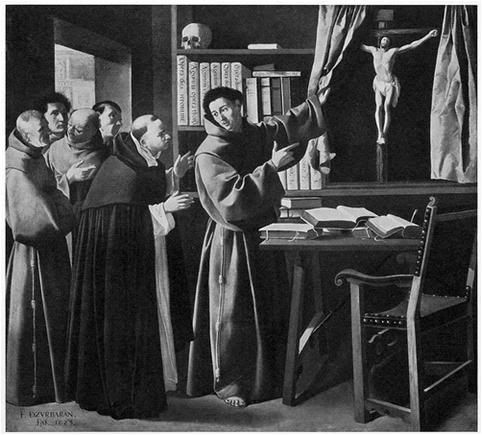 Francisco Zurbaran, Bonaventure shows Thomas Aquinas the Crucifix, 1629.
Francisco Zurbaran, Bonaventure shows Thomas Aquinas the Crucifix, 1629.
Bonaventure and Thomas were contemporaries [and studied together in Paris] in the 13th century, and advocated two different but complementary versions of reality.
For Bonaventure, the way to Truth is divine enlightenment, 'a mystic fact'. It requires, he said, "grace, not science, desire, not intellect, the aspiration of prayer, not the need to read". True wisdom, he thought, could be achieved only if one loves Christ to the point of sharing the Cross with him.
Benedict XVI said about Bonaventure in the General Audience on May 14, 2008:
"Love sees more than reason ... love sees, love is an eye, and experience gives us more than reflection. And Bonaventure saw such experience in the life of St. Francis: the experience of a very humble path, very realistic, this day-to-day walking with Christ, accepting his Cross.
"In this poverty and this humility, in the humility which one can live even in ecclesiality, there is an experience of God that is higher than that which one achieves through reflection, one in which we truly touch the heart of God".
For his part, St. Thomas achieved an 'admirable synthesis' of reason and faith: "Reason, illuminated by faith, finds the power to raise itself to the knowledge of God and spiritual realities," the Pope has said, addressing today's society in which reason is increasingly weak and incapable of admitting "the existence of any truth".
He exhorts us "to rediscover human rationality in a new way", and to have great trust in reason. He calls on Christians to know "how to express the reasonableness of their faith", bearing witness to it "in a dialog inspired by love".
"If we look at the great options, the Christian option is, even today, the most rational adn the most human. Thus we can confidently elaborate a philosophy, a vision of the world which is based on this priority of reason, on this trust that creative Reason is love, and that this love is God", the Pope said in an encounter with the young people of the Diocese of Rome in April 2006.
St. Bonaventure and St. Thomas - two theologians at the head of two schools of thought which, for centuries, have contended at the philosophical and theological levels.
Two saints who, through different ways, dedicated their lives to the Gospel, to Jesus, and achieving their birth in heaven in the same year, 1274.
[The RV reporter inexplicably fails to cite the one text in which Benedict XVI has spoken of Thomas Aquinas - an Angelus homily on 1/28/07, the liturgical feast of St. Thomas. It can be found on
freeforumzone.leonardo.it/discussione.aspx?idd=354486&p=12
Fr. Schall made it the subject of one of his essays at the time.]
[Modificato da TERESA BENEDETTA 01/08/2009 13:53] |
| |
 01/08/2009 14:49 01/08/2009 14:49 |
|
| | | OFFLINE | | Post: 18.068
Post: 728 | Registrato il: 28/08/2005
Registrato il: 20/01/2009 | Administratore | Utente Senior | |
|

Saturday, August 21
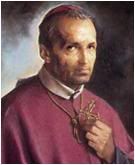 ST. ALPHONSUS LIGUORI (Italy, 1696-1787)
ST. ALPHONSUS LIGUORI (Italy, 1696-1787)
Bishop, Confessor, Doctor of the Church
Founded the Redemptorist Order
(Congregation of the Most Holy Redeemer)
OR today.
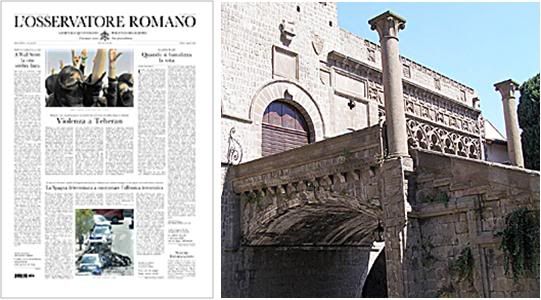
No papal news on Page 1 of this issue. Inside, the program of his visit to Viterbo and Bagnoregio
on Sept. 6 (photo shows a view of the Palace of the Popes in Viterbo). Page 1 has a commentary
against the abortion pill RU-486 which is being commercialized in Italy (with an inside-page story
stating the Italian Health Minister's opinion that RU-486 would violate the Italian law that specifies
the circumstances under which abortion is legal). Other Page 1 stories: new Tehran crackdown on
demonstrators continuing to protest the legitimacy of the presidential elections held in June; Spain's
new push against Basque terrorists; and 'the crisis seems over on Wall Street' [this is the third
article in recent days in which the OR proclaims, in effect, that the financial crisis in the US is over!),
even as it cites new unemployment still rising by more than 500,000 jobs a week.
THE POPE'S DAY
The Holy Father met today with
- A delegation of athletes and officials representing the current world swimming championships in Rome.
Pluri-lingual address.
The Vatican also released
- The text of Cardinal Bertone's telegram to the Archbishop of Manila expressing the Holy Father's condolence
at the death of former Philippine President Corazon Aquino, who died of colon cancer yesterday at the age of 76.
- The text of the Holy Father's letter naming Cardinal Francis Arinze as his personal representative to the 9th
plenary assembly of the Federation of Asian bishops' conferences to be held in Manila from August 11-16.
THE POPE'S PRAYER INTENTIONS FOR AUGUST 2009
General prayer intention:
That public opinion may be more aware of the problems of millions of displaced persons and refugees, and that concrete solutions may be found for their often tragic situation.
Mission intention:
That those Christians who are discriminated against and persecuted in many countries because of the name of Christ may have their human rights, equality and religious freedom recognized, in order to be able to live and profess their own faith freely.
ON THE CONCERT FOR THE POPE TOMORROW
Tomororw evening (Sunday, 8/2), the Bavarian Chamber Orchestra of Bad Brueckenau will present a concert for ope benedict XVI and his brother, Mons. Georg Ratzinger, at the inner courtyard of the Apostolic Palace in Castel Gandolfo.
The program will consist of Benjamin Britten's A Simple Symphony, op. 4, Johann Sebastian Bach's Concerto for Oboe and Strings, BWV 1055; and Mozart's Concerta for Oboe and Orchestra, KV 314.
[Modificato da TERESA BENEDETTA 03/08/2009 03:09] |
| |
 01/08/2009 15:48 01/08/2009 15:48 |
|
| | | OFFLINE | | Post: 18.069
Post: 728 | Registrato il: 28/08/2005
Registrato il: 20/01/2009 | Administratore | Utente Senior | |
|
 POPE BENEDICT AND THE SWIMMERS
The president of FINA,the international swimming federation, greets the Holy Father...
POPE BENEDICT AND THE SWIMMERS
The president of FINA,the international swimming federation, greets the Holy Father...
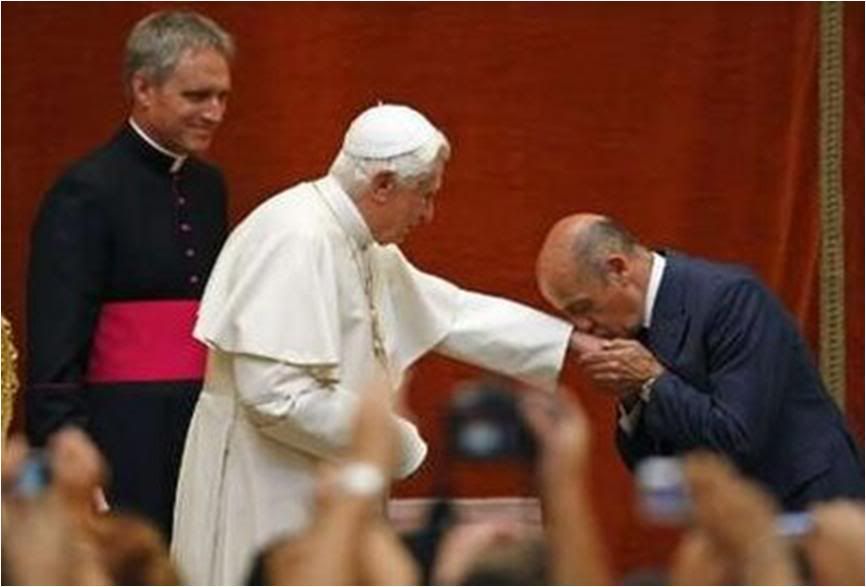 ...and the President of the Italian swimming federation presents him with a set of 2009 commemorative medals:
...and the President of the Italian swimming federation presents him with a set of 2009 commemorative medals:
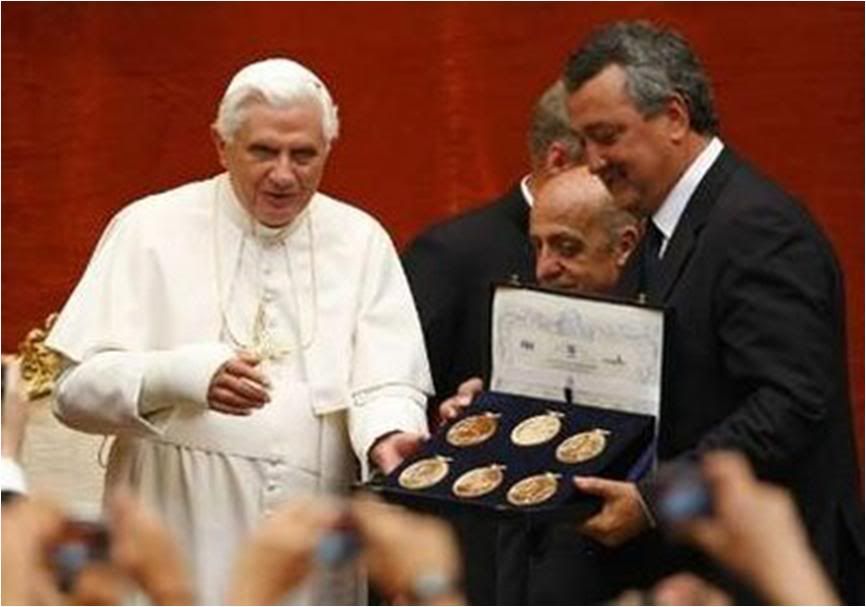 ...as well as the team suitcase:
...as well as the team suitcase:
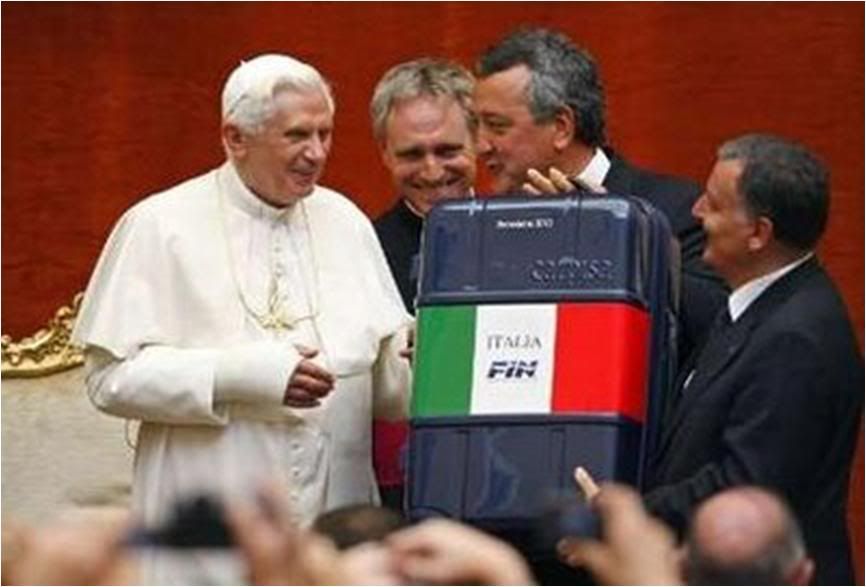 Pope meets swimming championship athletes,
Pope meets swimming championship athletes,
praises their 'exciting performance'

VATICAN CITY, Aug. 1 (AP) — Pope Benedict XVI on Saturday met athletes participating in the swimming world championships in Rome and urged them to act as role models for fellow youths "in sports and in life."
Benedict blessed and shook hands with athletes in the courtyard of his summer residence of Castel Gandolfo in the hills outside Rome, and praised their "exciting performance."
He playfully put on sports hats the athletes gave him and triumphantly raised a plush green frog — the mascot of the Rome championships.
Among those handing the gifts to Benedict were fellow German Paul Biedermann, who beat American Michael Phelps in the 200-meter freestyle on Tuesday, and Italy's double gold medallist Federica Pellegrini. The two also gave Benedict an Italy and a Germany jersey, and Biedermann's was autographed by his teammates.
Though Phelps was invited, he skipped the audience to rest before his final individual race of the world championships later Saturday.
Benedict blessed the crowd of about 100 athletes, organizers and volunteers using his right hand, encased in a cast since he fell and broke his wrist two weeks ago while vacationing in the Italian Alps.
[A Vatican Radio report says some 2,500 persons came to the audience, which means almost everyone who had anything to do with the event must have shosen to come.]
In a speech, he praised the athletes for choosing to train hard and make sacrifices to succeed in sports.
"With your competitions you offer to the world an exciting performance of discipline and humanity, artistic beauty and tenacious will," Benedict said. "You, dear athletes, are models for your fellow youths and your example can be decisive in positively building their future. Therefore, be champions in sports and in life!"
Benedict also worked an apt sports pun into his speech, telling the athletes: "I hope that you will 'swim' toward ever higher, unmatchable ideals."
Italy's golden girl, Federica Pellegrini, world titleholder in the 200 and 400-m women's freestyle, was chosen to represent the women swimmers with a personal greeting to the Pope.
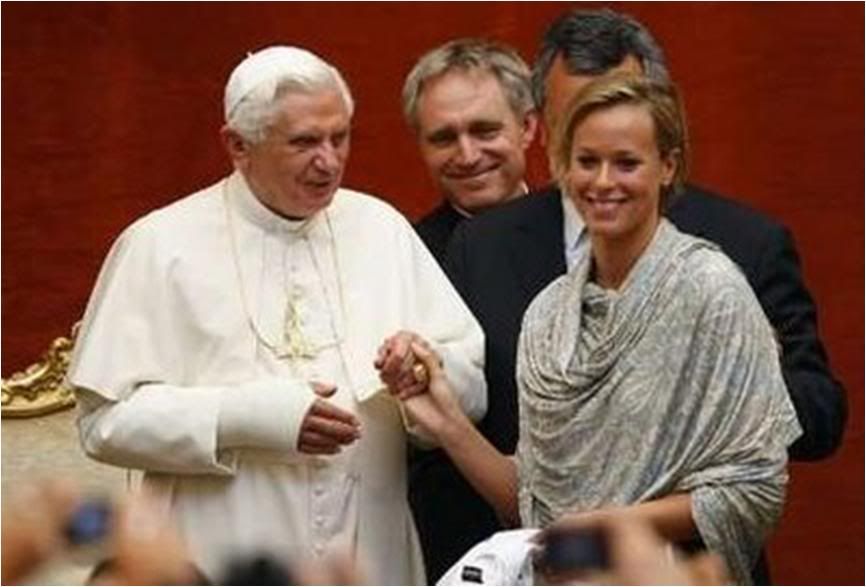 Paul Biedermann, who beat Michael Phelps* in the 200-m freestyle, was understandably chosen by the FINA officials to represent
Paul Biedermann, who beat Michael Phelps* in the 200-m freestyle, was understandably chosen by the FINA officials to represent
the male swimmers - he is a German:
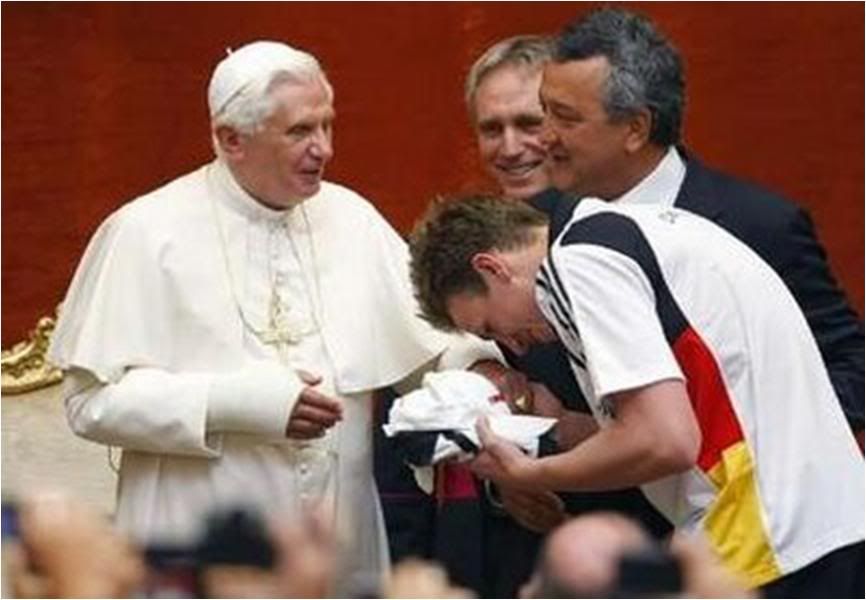 He presents him with a T-shirt signed by the entire German team, and yet another cap.
He presents him with a T-shirt signed by the entire German team, and yet another cap.
 The Pope enjoys his new headgear...
The Pope enjoys his new headgear...
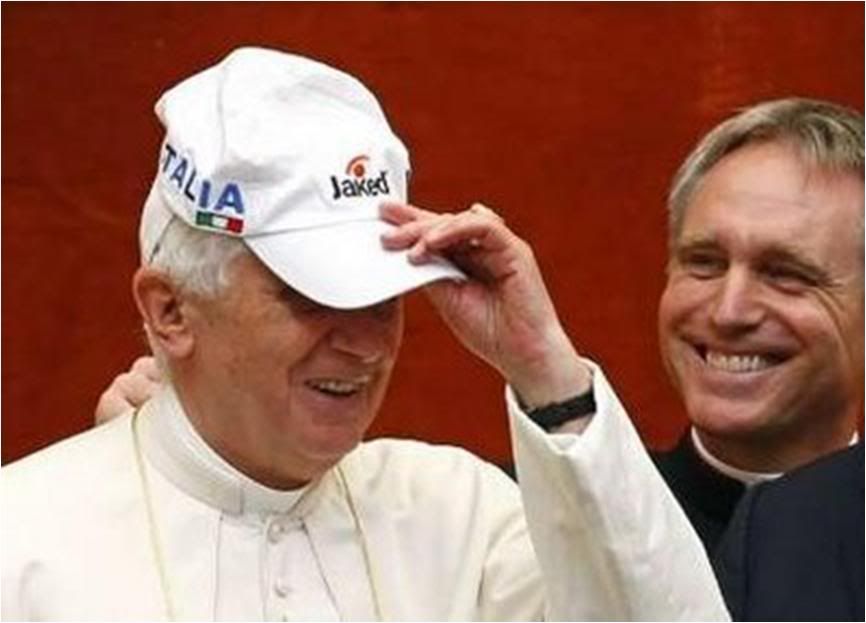 ...and also gets Diva-09, the frog mascot of the 2009 championships.
...and also gets Diva-09, the frog mascot of the 2009 championships.
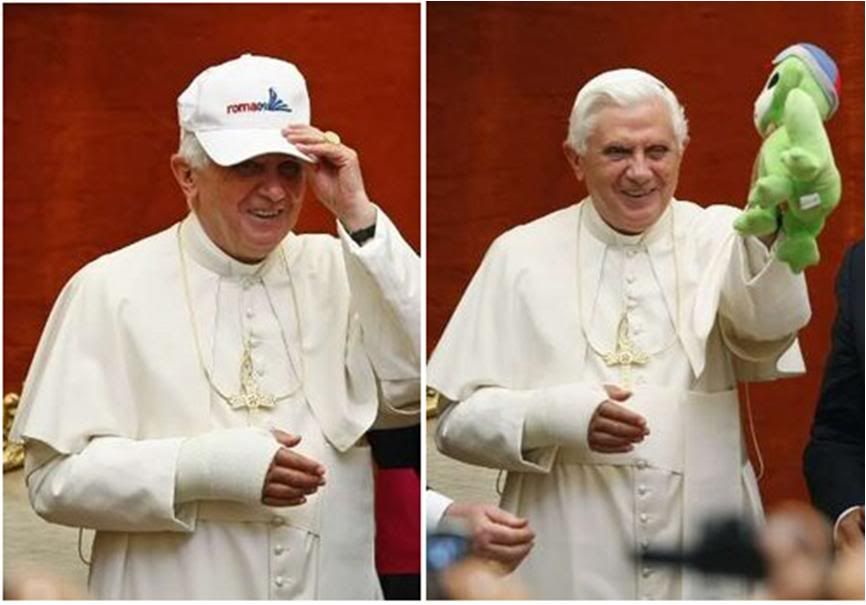
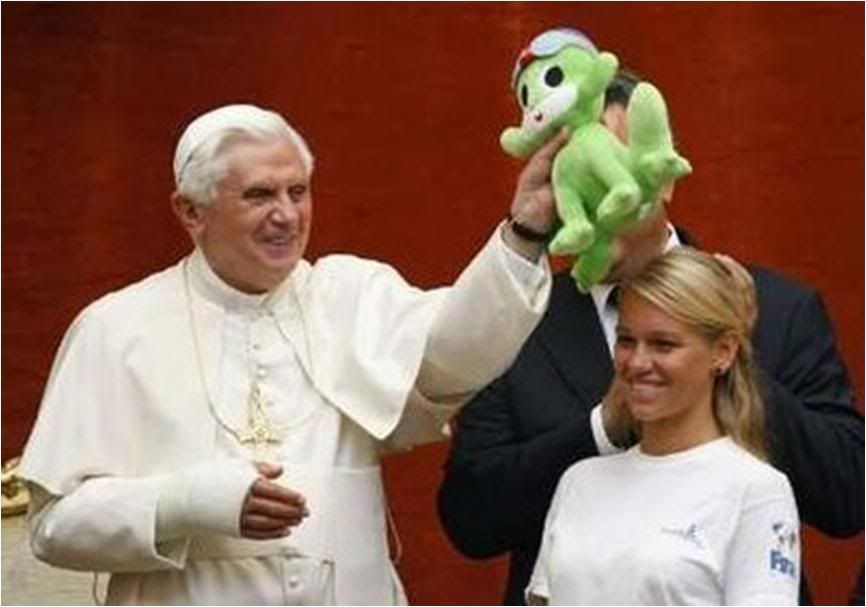
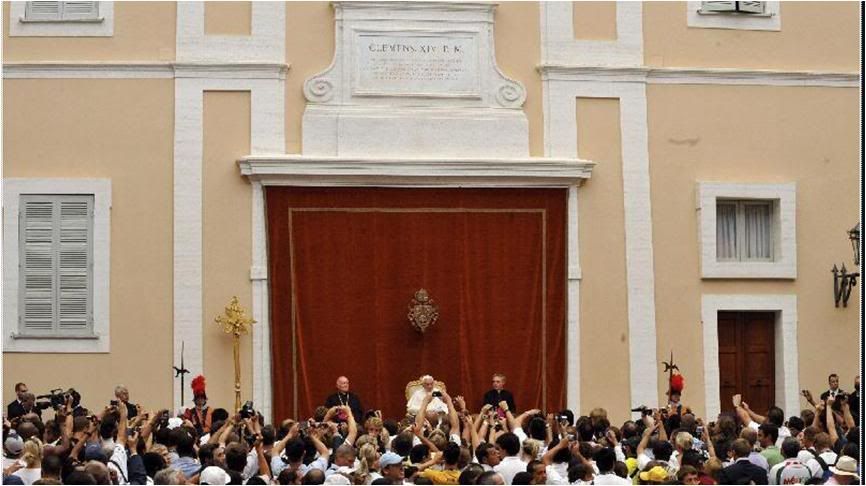 Here is a translation of the Pope's plurilingual remarks to the delegation:
Here is a translation of the Pope's plurilingual remarks to the delegation:
He started in Italian:
Dear friends,
I accepted with sincere pleasure your invitation to meet with you during these World Swimming Championship meet.
Thank you for your visit. I gladly extend to each of you my heartfelt welcome! I especially greet the president of the World Swimming Federation FINA, Mr. Julio Maglione, and the president of the Federazione Italiana Nuoto (FIN), Hon. Paolo Barelli, whom I thank for the kind words he addressed to me.
I greet all the officials present, technicians, delegates, newsmen and media workers, volunteers, organizers and all those who have contributed to the realization of these championships.
And my affectionate greeting goes especially to you, dear athletes of different nationalities, who are the protagonists in these swimming events.
With your competitions, you offer to the world an attractive display of discipline and humanity, of artistic beauty and tenacious will.
You show what goals can be reached by the vitality of youth when it does not reject the effort of hard training and gladly accepts not a few sacrifices and privations. All this constitute for your contemporaries an important lesson in life.
As we were just reminded, sport when practised with passion and a watchful ethical sense, becomes, especially for the youth, a training ground for healthy competition and striving for physical perfection, a school of formation in human and spiritual values, a privileged ground for personal growth and social contact.
By simply watching these championships and admiring the results achieved, it is not difficult to note how much potential God has endowed the human body and what interesting goals of perfection it can achieve.
It reminds me of the wonder expressed by the Psalmist who, contemplating the universe, sings the glory of God and the grandeur of being human.
"When I see your heavens, the work of your fingers, the moon and stars that you set in place - what are humans that you are mindful of them, mere mortals that you care for them? Yet you have made them little less than a god, crowned them with glory and honor" (Ps 8,4-6).
How then can we not thank the Lord for having endowed man's body with such perfection, for having enriched it with a beauty and harmony that can be expressed in so many different ways!
The sporting disciplines, each with its own modalities, help us to appreciate this gift which God has given us. The Church follows and takes care of sports activities which are practised not as an end in themselves, but as a means, as a precious instrument for the perfect balanced training of the whole person.
Even in the Bible we find interesting references to sport as a metaphor for life. For example, the Apostle Paul considers it an authentic human value - he uses it not only as a metaphor for illustrating elevated ethical and ascetic ideals, but also as a means for human formation and as a component of his culture and his civilization.
You, dear athletes, are models for your contemporaries, and your example can be decisive for them in positively building their own future. Therefore, be champions of sport as well as life!
John Paul II first articulated this when, meeting the world of sport in October of the Jubilee year 2000, he underlined the great importance of sports activities precisely because "it can favor the affirmation among the youth of important values like loyalty, perseverance, friendship, sharing, solidarity" (Teachings, Vol. XXIII/2, p. 729).
Moreover, sports manifestations like yours, thanks to modern means of social communications, exercise a remarkable impact on public opinion, since the language of sports is universal and particularly gets to the new generations.
Therefore, using sports as a vehicle for positive messages contributes to build a more fraternal world.
In French he said:
Dear French-speaking friends in sport, I am happy to welcome you and greet you cordially on the occasion of the world swimming championships.
The sport you practise is a school of generosity, loyalty and respect for others. May it favor the development of friendship and sharing among persons and peoples. And may God bless you!
In English, he said:
I am pleased to greet the English-speaking athletes taking part in the International Swimming Federation World Championships, together with the many officials, support staff, volunteers and friends who have joined you here in Rome during these days.
May your pursuit of excellence be accompanied by gratitude for your God-given gifts and a desire to help others to use their own gifts in building a better and more united world. Upon you and your families I invoke God’s blessings of joy and peace!
In German:
From my heart I greet the German-speaking participants in these World Swimming Championships. Dear friends, as sports competitors, you have received optimal training and are models for many young people. Stand for good and lasting values in your own lives, so that sports can serve the development of the gifts that God has given men. May God bless you in all your endeavors!
In Spanish:
I salute all those Spanish-speaking persons present - athletes, officials and all those who have taken part in various ways in this World Swimming Championships.
I invite you to continue promoting sports according to the highest human values, in a way that favors the healthy physical development of all those who practise sports as an option for the integral formation of children and young people. Thank you.
In Portuguese:
Dear Portuguese-speaking friends who are taking part in these World Swimming Championships, I greet you all from the heart, and take the occasion to thank you for the lesson of life that you offer to the world - a lesson of discipline and humanity, of artistic beauty and strong will to win, and above all, to conquer oneself.
I invoke the help of God for you and your families and impart to you the Apostolic Blessing.
He ended in Italian:
Dear friends, and especially you, dear athletes, while I thank you once more for this encounter, I hope that you may 'swim' towards ever more unprecedented ideals.
I assure you of remembrance in my prayers, and invoke divine blessings on you, your families and all those dear to you, through the intercession of the Blessed Virgin Mary.
I think the Pope's reflections above on the God-given wonder of the human body and its possibilities - and the citation from Psalm 8 - deserve to be included in every program on sports - in which the ideals stressed are always the abstract ones, almost taking for granted the very obvious physical/corporeal basis of every sports achievement.

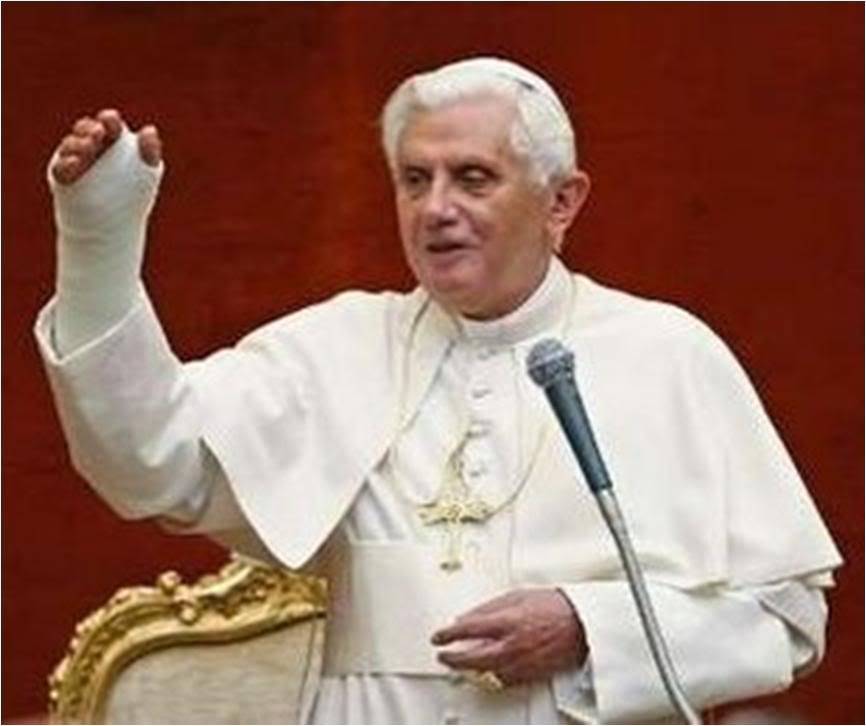 *About the decision by Phelps, the wonder boy of the 2008 Olympics, not to join the papal audience. His coach said he needed to rest for his next event. I suspect it could have been out of pique, too, because Biedermann - whose win over Phelps is controversial because he wore a swimsuit that the swimming federation has now decided to ban - was chosen to represent the male swimmers personally presented to the Pope. A most ill-thought decision, among other things because if Phelps had been there, the Pope himself would have known to seek him out.
*About the decision by Phelps, the wonder boy of the 2008 Olympics, not to join the papal audience. His coach said he needed to rest for his next event. I suspect it could have been out of pique, too, because Biedermann - whose win over Phelps is controversial because he wore a swimsuit that the swimming federation has now decided to ban - was chosen to represent the male swimmers personally presented to the Pope. A most ill-thought decision, among other things because if Phelps had been there, the Pope himself would have known to seek him out.
P.S. It seems, from Cowgirl's account in a post below, that Phelps may have been asked to represent the male swimmers, but unwisely decided to turn it down. In which case, I apologize for my erroneous surmise above.
[Modificato da TERESA BENEDETTA 05/08/2009 03:50] |
| |
 01/08/2009 18:45 01/08/2009 18:45 |
|
| | | OFFLINE | | Post: 18.071
Post: 731 | Registrato il: 28/08/2005
Registrato il: 20/01/2009 | Administratore | Utente Senior | |
|

 John Allen here rightly sets the record straight on the Holy Father's sense of ecology - "safeguarding Creation' - a Christian ecology which is comprehensive and integral, quite distinct from what we might call the 'cafeteria ecology' pushed by the global-warming fanatics, Greenpeace and other ecological activists.
John Allen here rightly sets the record straight on the Holy Father's sense of ecology - "safeguarding Creation' - a Christian ecology which is comprehensive and integral, quite distinct from what we might call the 'cafeteria ecology' pushed by the global-warming fanatics, Greenpeace and other ecological activists.
But to call him the 'green Pope' or the 'greenest Pope' erroneously lumps him with the narrow-minded ecologists to the detriment of his integral ecological message. The cafeteria ecologists are generally the very people who also promote contraception, abortion, euthanasia and homosexual unions - i.e., they oppose their own cultural standards to the integral divine message of Creation.
If one must use the color metaphor at all - and there's no reason to do so, except to reinforce cliches - then I wouldn't refer to Benedict's 'very own shade of green', which would seem to limit his sense of ecology to a single-tone palette, when it is anything but!
He is more properly 'panchromatic' or 'omni-chromatic' - reflecting all the colors possible in the infinity of God's creation. What I suppose one might call the real rainbow approach, even if homosexual activists have coopted the term 'rainbow'. Very simply, I would call the Pope's ecology 'integral ecology'.
Benedict XVI’s
very own shade of green

July 31, 2009
Pope Benedict XVI’s track record on the environment already has been robust enough to justify a book-length treatment, Ten Commandments for the Environment by Woodeene Koenig-Bricker, in which he’s proclaimed the greenest Pope in history. This week brought three additional signals of the Pope’s remarkable ecological sensitivity:
[I wouldn't call it 'remarkable', since such a sense of ecology should come naturally to any Pope, or Christian, for that matter. It is true he has been the most vocal about the issue in the decades since it first became universally recognized as an issue.]
- The Vatican announced that the theme of the Pope’s annual message for the World Day of Peace is, “If you want to cultivate peace, take care of creation.”
A brief statement asserted that resolving the “present ecological crisis” is essential to promoting peace in the world, citing environmental threats such as over-use of natural resources and climate change.
- During a vespers service last Friday in northern Italy, Benedict XVI made a brief but unmistakably positive reference to the late Jesuit scientist and philosopher Pierre Teilhard de Chardin, widely considered the patron saint of Catholic ecology.
[Not really. To begin with, he has not been proclaimed a saint. And I doubt that majority of Catholics who call themselves ecologists are necessarily aware of who Teilhard de Chardin was, or what he has to do with ecology.]
The line prompted speculation in the Italian press about a possible “rehabilitation” of Teilhard, whose daring cosmic theology was faulted for “ambiguities and indeed even serious errors” in a 1962 Vatican judgment that was confirmed in 1981.
- Solar panels were installed this week on the Pope’s private home in Regensburg, Germany, which are expected to feed power into the German electric grid.
That move comes on the heels of the 2008 installation of solar panels atop the Vatican’s audience hall, a project which captured the 2008 Euro Solar Prize (awarded by a secular environmental foundation).
This week’s new developments reinforce the impression that Benedict’s environmentalism -- expressed in both words and deeds -- has to rate as the most striking feature of his social teaching. [Striking, yes, but not the most. Defense of life remains the most striking feature of Catholic social teaching - because it so obviously counter-cultural - but it comes under the heading of 'integral ecology' rather than mere 'environmentalism'.]
That said, calling Benedict XVI an “environmentalist” nonetheless can court confusion, because his approach departs at the roots from that of secular European Green parties or the Sierra Club. In light of this week’s additions to his record, it’s worth fleshing out three unique features of Benedict’s ecological vision.
Theistic Ecology
Obviously, Benedict XVI approaches environmental issues as a religious believer, convinced that nature is the “book of creation.”
More than that, however, Benedict has implied that theism is not merely one among many points of entry into environmental concern -- it is actually the only way to achieve a balanced ecology, ensuring that the environment is respected without being turned into a fetish.
In effect, Benedict’s thinking on the environment seems to presume that there are three cultural models on offer to understand humanity’s relationship with the environment:
- A secular/scientific approach, which imparts no particular moral status to nature -- its aim is technical domination, regarding the material world as raw material for creative exploitation.
- A pagan or pantheistic view (including its romantic modern variants), which sees nature itself as the source of divinity, and thus regards it as taboo.
- A theology of creation, which regards nature as a gift of the Creator, to be used for the common good of the human family -- both its current members and future generations.
Here’s how Benedict put it in his recent social encyclical, Caritas in Veritate:
When nature, including the human being, is viewed as the result of mere chance or evolutionary determinism, our sense of responsibility wanes. In nature, the believer recognizes the wonderful result of God’s creative activity, which we may use responsibly to satisfy our legitimate needs, material or otherwise, while respecting the intrinsic balance of creation. If this vision is lost, we end up either considering nature an untouchable taboo or, on the contrary, abusing it.
That schema represents a striking departure from the early days of the environmental movement, when it was fashionable to fault the entire Judeo-Christian tradition for humanity’s savage indifference to the earth.
Professor Lynn White Jr. of the University of California published an influential article in the journal Science in 1967, in which he blamed the Bible for making Westerners feel “superior to nature, contemptuous of it, willing to use it for our slightest whim.”
(Catholic writer Stratford Caldecott notes that White’s article has become the obligatory point of departure for every discussion of Christianity and the environment; the article, he says, “is famous, and famous for being famous.”)
In effect, Benedict XVI has gone on the offensive, arguing that rather than being the cause of the ecological crisis, Christianity is actually its solution.
Depending on how it develops, a “both/and” Christian ecology could help inject balance into the growing tension between environmentalism and economic development, especially in poor nations. Here’s an example of how those tensions play out:
In May 2003, the U.S.-based Congress for Racial Equality issued a statement bitterly critical of Greenpeace for its opposition to genetically modified crops, asserting, “Well-fed eco-fanatics shriek ‘Frankenfoods’ and ‘genetic pollution’ ... Greenpeace policies bring misery, disease and death to millions of people in developing countries, particularly in Africa.”
An approach that does not set human development in opposition to natural conservation, but rather strives to see the two as integrally related, could help point beyond such standoffs.
Natural Law
Whenever Church officials enter a moral debate these days, someone will inevitably object that they’re attempting to impose a particular religious teaching upon a pluralistic culture.
According to this way of thinking, Church teaching on abortion, stem cell research or cloning is disqualified as a basis for public policy because it’s sectarian in nature. That’s a deeply frustrating reaction for thinkers such as Benedict XVI, who argue that it puts things exactly backward.
Abortion and human cloning are not wrong because the Church says so, they insist -- rather, the Church says so because they’re wrong.
The argument goes like this: The Church’s moral teachings are not a set of arbitrary rules for joining the Catholic club, like wearing a fez or using a secret handshake. They’re based on universal truths rooted in human nature, which in principle anyone can recognize.
This mode of reasoning is known as a “natural law” argument. It assumes that right and wrong, truth and falsehood, are real qualities which exist in nature, and which human beings can discover using their conscience.
So when Catholicism says “x is wrong,” the ultimate validity of that claim rests not on the authority of the Church, but the fact that x really is wrong.
According to Benedict’s vision, today’s environmental problems, from climate change to deforestation, illustrate that natural law is real. We now clearly understand, for example, that endlessly pumping out greenhouse gases in order to satisfy our consumer instincts exacts an objective physical price.
In that sense, Benedict XVI sees the rising tide of environmental consciousness as the most promising route for a recovery of the natural law tradition.
In July 2007, Benedict said that environmentalism presumes that there are laws written into creation, and that “obedience to the voice of the earth is more important for our future happiness than the voices of the moment, the desires of the moment.”
Without any reference to religion, Benedict seems to believe, the secular world today is arriving at its own version of natural law theory.
To put the Pope’s point simplistically, if the world is willing to limit its carbon output on the basis of the laws of nature, then maybe it will become more willing to accept limits in other spheres of life as well.
Pro-Life Environmentalism
From the beginning, the modern environmental movement has often been linked to alarm about human-overpopulation, both on the practical basis that larger populations put a great strain on the environment and on the theoretical grounds that human prerogatives should not trump the moral standing of the natural world and of other forms of life.
Once again, Benedict XVI turns this claim on its head. The Pope argues that not only is openness to new life not at odds with environmental sensitivity, but that in fact you can’t have one without the other. As he put it in Caritas in Veritate (No. 51), the world cannot protect natural ecology without also honoring “human ecology.”
The deterioration of nature is closely connected to the culture that shapes human coexistence: when “human ecology” is respected within society, environmental ecology also benefits. ...
In order to protect nature, it is not enough to intervene with economic incentives or deterrents; not even an apposite education is sufficient. The decisive issue is the overall moral tenor of society.
If there is a lack of respect for the right to life and to a natural death, if human conception, gestation and birth are made artificial, if human embryos are sacrificed to research, the conscience of society ends up losing the concept of human ecology and, along with it, that of environmental ecology.
It is contradictory to insist that future generations respect the natural environment when our educational systems and laws do not help them to respect themselves.
The book of nature is one and indivisible: it takes in not only the environment but also life, sexuality, marriage, the family, social relations: in a word, integral human development. ... It would be wrong to uphold one set of duties while trampling on the other.”
What all this suggests is that while Catholicism under Benedict XVI is indeed turning ever greener, it’s a distinctive shade of green -- one that’s not simply about baptizing secular environmental movements, or applying a veneer of Christian vocabulary to a worldview that rests on very different premises.
****
So then, let's quit 'baptizing' Benedict with the hip lexicon of the times, especially when it is inappropriate, misleading or even erroneous!
[Modificato da TERESA BENEDETTA 01/08/2009 18:54] |
| |
 01/08/2009 21:08 01/08/2009 21:08 |
|
| | | OFFLINE | Post: 155
Post: 0 | Registrato il: 28/05/2007
Registrato il: 19/02/2009 | Utente Comunità | Utente Junior | |
|
Hi Teresa,
it's Paul Biedermann. He won the 400 and 200 m freestyle titles.
He's a very humble guy. Very nice. Very young (21).
I know he was originally not a member of the delegation to see the Pope and even said he needed to prepare for his next event.
Since Mr. Phelps turned it down, I guess he decided to go, instead. Good for him!!
 Thanks for the info, Heike! Paul does look like a very nice young man. Impression further reinforced in that he kissed the Pope's ring!
Thanks for the info, Heike! Paul does look like a very nice young man. Impression further reinforced in that he kissed the Pope's ring!
Now, I seem to have a better picture: Very likely, the organizers first asked Phelps to represent the male swimmers, but he declined
for the reason he gave. So they did the obvious thing: Ask Biedermann, who is German, and a meet star in his own right, despite
the controversy over the new type bodysuit he wore. Good for Paul!
He might feel as euphoric now as Federica Pellegrini, who said she felt more nervous about getting to meet the Pope than before
starting a race. She also said she's still floating on air because the Pope told her he had watched all her races during this meet.
TERESA
[Modificato da TERESA BENEDETTA 05/08/2009 03:52] |
| |
 02/08/2009 14:09 02/08/2009 14:09 |
|
| | | OFFLINE | | Post: 18.074
Post: 734 | Registrato il: 28/08/2005
Registrato il: 20/01/2009 | Administratore | Utente Senior | |
|

Sunday, August 2
 ST. EUSEBIUS OF VERCELLI (Italy, 283-371)
ST. EUSEBIUS OF VERCELLI (Italy, 283-371)
Bishop and Confessor
OR today.
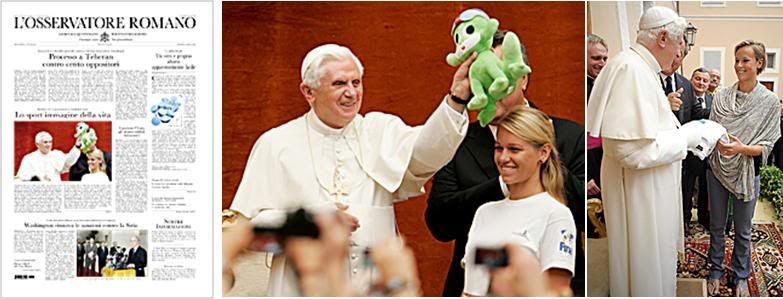
Benedict XVI to participants in the World Swimming Championships :
Sports as an image of life
Other Page 1 stories: A French scientist writes about RU-486 as an apparently easy abortifacient with serious safety issues; Tehran starts
trials against a hundred demonstrators arrested during the post-election protests; the last UK soldiers leave Iraq, last of the US's wartime
coalition partners to do so; Washington renews sanctions against Syria, which the Obama administration had been courting.
THE POPE'S DAY
Angelus today - The Holy Father spoke about the significance of the Year for Priests, recalling a number
of priest-saints whom the Church commemorates in the first week of August, starting with St. Alfonso Liguori (8/1),
St. Francis of Assisi today on the anniversary of the 'Assisi indulgence', St. Jean Marie Vianney - patron saint
of priests - (8/4), St. Gaetano of Thiene (8/7), and St. Dominic (8/8), as well as Pope Paul VI on the 8/6 anniversary
of his death in Castel Gandolfo in 1978.
Chamber concert at 6 p.m. - The Bavarian Chamber Orchestra of Bad Brueckenau will perform Benjamin Britten's
A Simple Symphony; Bach's Concerto for Oboe and Strings' and Mozart's Concerto for Oboe and Orchestra, in the
inner courtyard of the Apostolic Palace.
[Modificato da TERESA BENEDETTA 03/08/2009 01:52] |
| |
 02/08/2009 14:33 02/08/2009 14:33 |
|
| | | OFFLINE | | Post: 18.075
Post: 735 | Registrato il: 28/08/2005
Registrato il: 20/01/2009 | Administratore | Utente Senior | |
|
 ANGELUS TODAY
ANGELUS TODAY
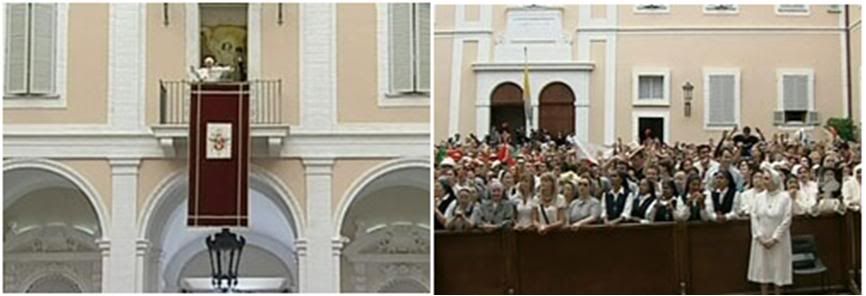
The Holy Father led the noon Angelus prayers from the inner courtyard of the Apostolic palace at Castel Gandolfo today.
He spoke about the significance of the Year for Priests, recalling a number of priest-saints that the Church commemorates in the first week of August: St. Alfonso Liguori (8/1), St. Francis of Assisi today on the anniversary of the 'Assisi indulgence', St. Jean Marie Vianney - patron saint of priests - (8/4), St. Gaetano of Thiene (8/7), and St. Dominic (8/8), as well as Pope Paul VI on the 8/6 anniversary of his death in Castel Gandolfo in 1978.
To his Polish listeners, the Pope recalled the 65th anniversary of the Warsaw uprising against the Nazi occupiers that eventually led to the liberation of Poland.
He greeted the people of Castel Gandolfo on their traditional Sagra delle Pesche annual peach festival today.
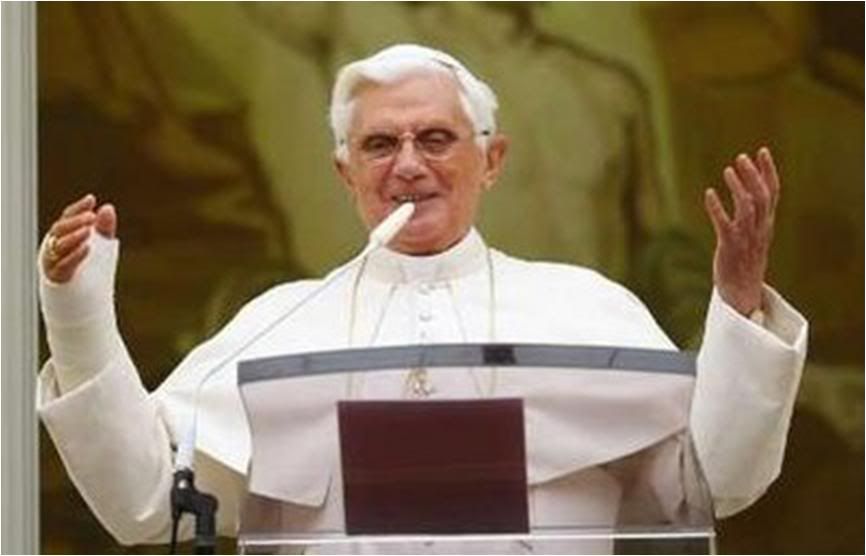
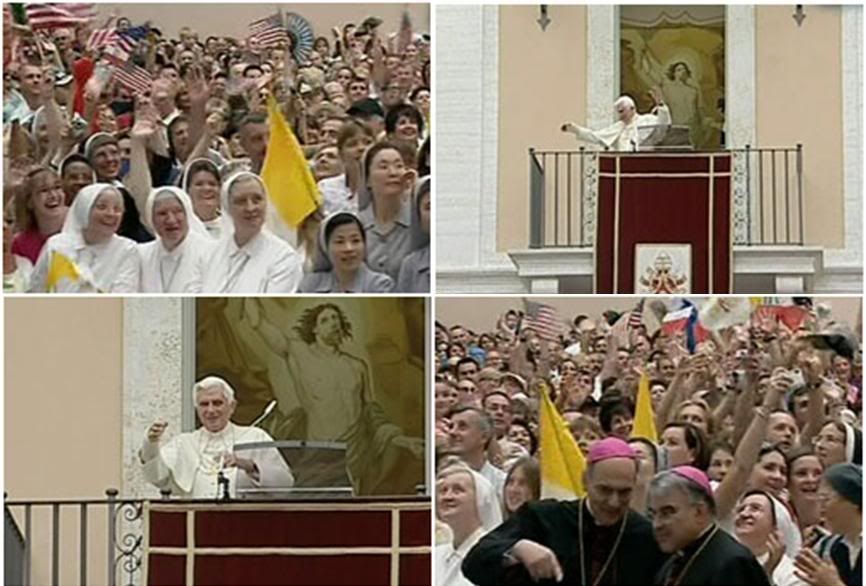
Here is the text of his English greeting:
I offer a warm welcome to the English-speaking visitors gathered for this Angelus prayer, including the international pilgrimage group of Sisters of Saint Felix of Cantalice.
In today’s Gospel, Jesus tells us to work for the food that remains unto life eternal. During these quiet days of summer, may all of us find spiritual nourishment in "the bread come down from heaven", offered to us daily in God’s holy word and in the sacrament of the Eucharist.
Upon you and your families I invoke an abundance of joy and peace in the Lord!
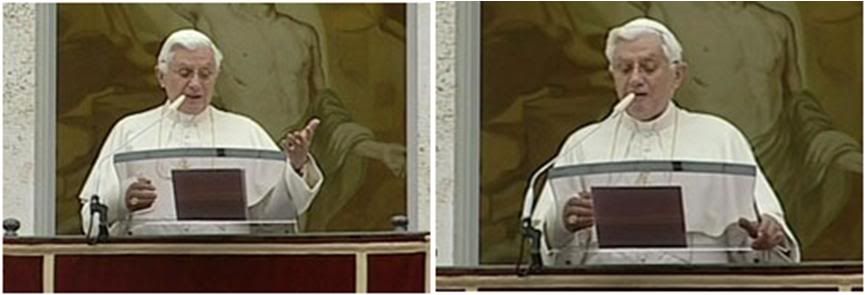 Here is a translation of the Pope's words before the Angelus prayers:
Here is a translation of the Pope's words before the Angelus prayers:
Dear brothers and sisters!
I returned a few days ago from Val D'Aosta, and I am sincerely pleased to be among you once again, dear friends of Castel Gandolfo.
To the Bishop, the parish priest, and to the parochial community, as well as to the civilian authorities and all Castellani, along with pilgrims and vacationers, I affectionately renew my greeting, along with my heartfelt thanks for your always cordial hospitality.
I also thank you for the spiritual closeness that many showed while I was in Les Combes and suffered a small injury to my right wrist.
Dear brothers and sisters, the Year for Priests that we are celebrating constitutes a precious occasion to look deeper into the value of the mission that priests have in the Church in the world.
In this respect, we are provided with useful points for reflection in the saints that the Church offers for our commemoration daily.
In these first days of August, for instance, we commemorate some who were true models of spirituality and priestly dedication.
Yesterday was the liturgical feast of St. Alfonso Maria de Liguori, Bishop and Doctor of the Church, great teacher of moral theology and a model of Christian and personal virtues, who was always attentive to the religious needs of the people.
Today, we contemplate in St. Francis of Assisi the ardent love for the salvation of souls that every priest should constantly nourish: it is, in fact, the anniversary of the so-called 'Assisi pardon' that he obtained from Pope Honorius III in 1216, after having a vision while praying in the little church of the Porziuncola.
Jesus appeared to him in his glory, with the Virgin Mary on his right and surrounded by many angels, and asked him to express a desire. Francis implored him for 'an ample and generous pardon' for all those who, 'repentant and having confessed', would visit the Porziuncola.
Having received the papal approval [for such an indulgence], the saint did not wait for any written document bur rushed back to Assisi, and at the Porziuncola, he announced the good news: "My brothers, I wish to send you all to Paradise!"
From then on, starting noon of August 1 to midnight of August 2, one can gain, under the usual conditions, a plenary indulgence even for the deceased, by visiting any parish church or Franciscan church.
And there is St. Jean Marie Vianney whom we commemorate on August 4. It was precisely to commemorate the 150th anniversary of his death that I declared the year for Priests.
In my next catechesis at the General Audience on Wednesday, I will speak more about this humble parish priest, who represents a model of priestly life not just for parish priests but for all priests.
On August 7, we commemorate St. Gaetano of Thiene (co-founder of the Theatine order) who used to say "souls are purified not by sentimental love but by love in deeds".
One day later, on August 8, the Church points us to the model of St. Dominic, of whom it was said that "he opened his mouth either to speak with God in prayer, or to speak about God".
And I cannot omit recalling the great figure of Papa Montini, whom we remember on August 6, the 31st anniversary of his death right here in Castel Gandolfo.
His life, which was profoundly priestly, and rich with such humanity, remains a gift to the Church for which we profoundly thank God.
May the Virgin Mary, Mother of the Church, help all priests to be totally enamoured of Christ, following the example of these models of priestly holiness.
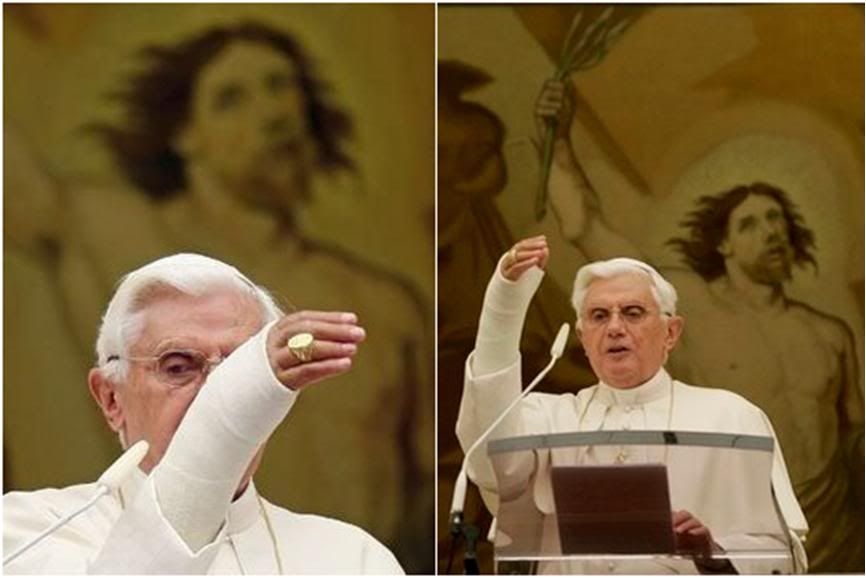
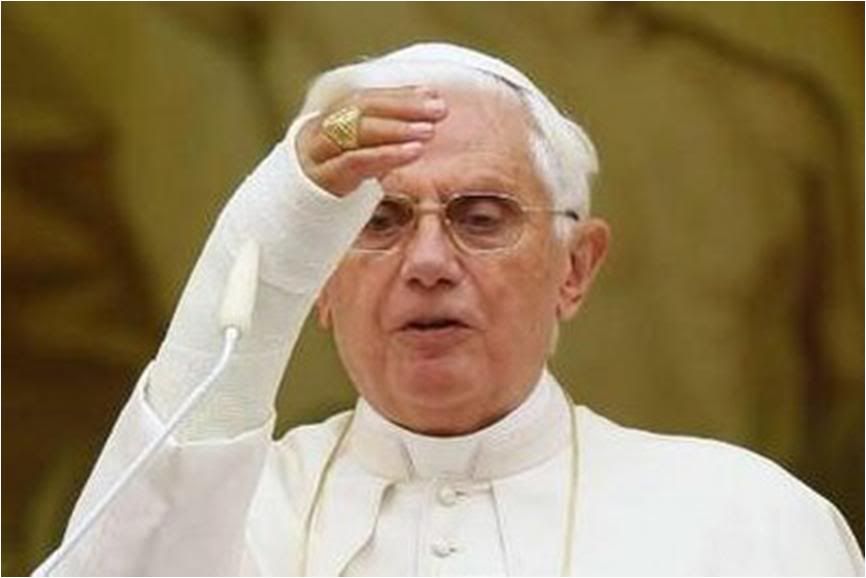 Pope hails heroism
Pope hails heroism
of 1944 Warsaw uprising

CASTEL GANDOLFO, Italy, Aug 2, 2009 (AFP) - Pope Benedict XVI hailed on Sunday the heroism of those who took part in the Warsaw uprising to liberate the Polish capital from Nazi occupation 65 years ago.
Speaking in Polish, the German Pope paid tribute to "all Poles" after his weekly Angelus prayer at his summer residence in Castel Gandolfo near Rome.
"From the heroism of the those who took part in the uprising and the strength of the nation, was born a free Poland," he declared.
"The sacrifice of their lives has brought the fruits of peace and prosperity for your nation. God bless Poland and each one of you."
In Warsaw on Saturday, thousands of Poles, many of them World War II veterans, commemorated the uprising which broke out on August 1 1944 against the Nazi occupation.
[Modificato da TERESA BENEDETTA 02/08/2009 15:34] |
| |
 02/08/2009 20:23 02/08/2009 20:23 |
|
| | | OFFLINE | | Post: 18.078
Post: 738 | Registrato il: 28/08/2005
Registrato il: 20/01/2009 | Administratore | Utente Senior | |
|
 PHOTO POST-SCRIPT:
PHOTO POST-SCRIPT:
Departure from Les Combes
Just came across these photos from Catholic Press - among other things, they provide an impressive if unintended study of Benedict XVI in motion - the dynamism and kinetic energy that come forth strongly even in still photographs.
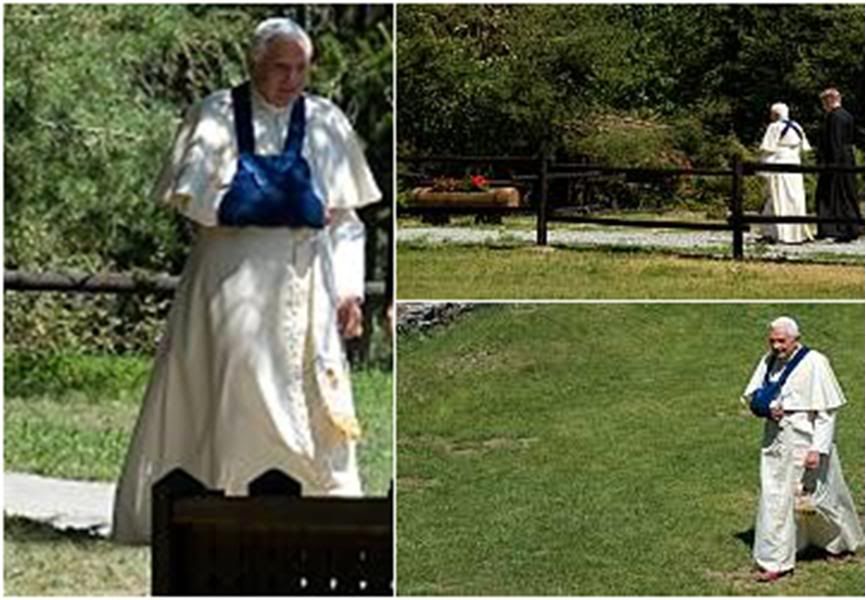
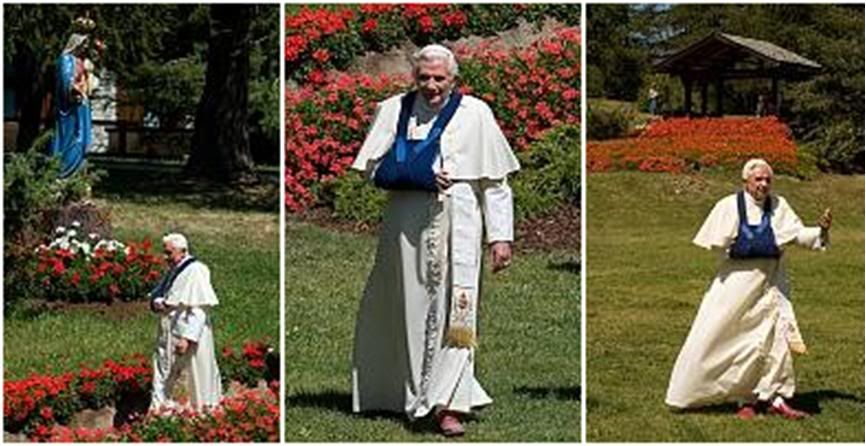
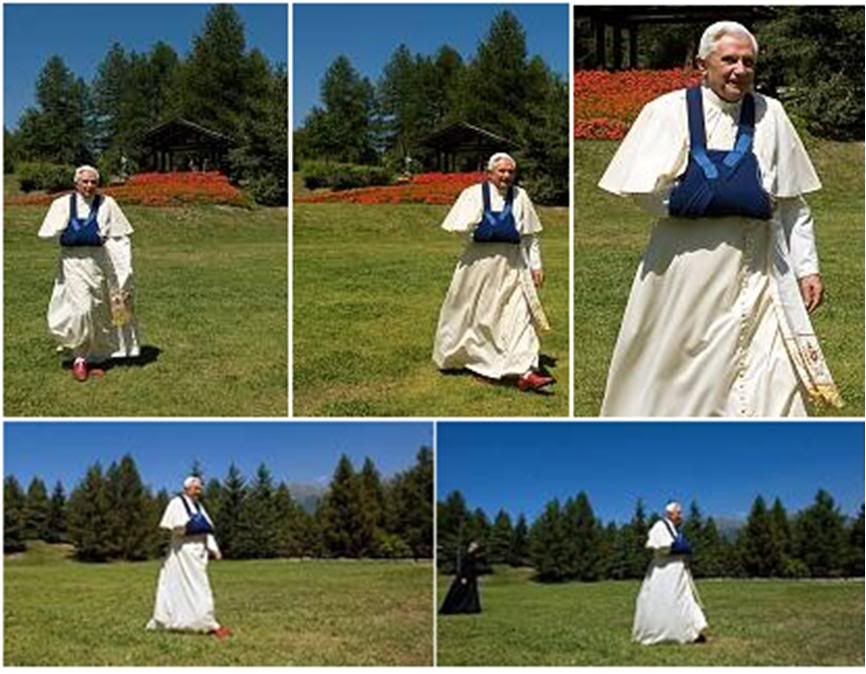 Our Papino is truly remarkable for a man his age and someone who suffered at sport! The lesson: One doesn't have to be an athlete or exercise buff to be physically fit. Cycling and walking evidently worked well for JR/B16... And obviously it was only his wrist he hurt when he stumbled that night in Les Combes.
Our Papino is truly remarkable for a man his age and someone who suffered at sport! The lesson: One doesn't have to be an athlete or exercise buff to be physically fit. Cycling and walking evidently worked well for JR/B16... And obviously it was only his wrist he hurt when he stumbled that night in Les Combes.
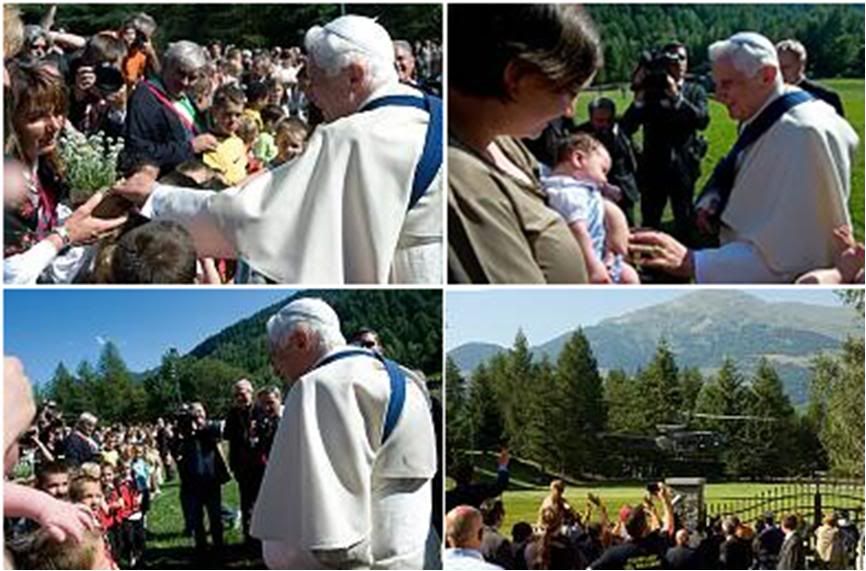 (As I had to work with thumbnails in order to avoid the CPP watermark, I cannot enlarge the photos farther without losing sharpness.)
All the above ties in with the Pope's message yesterday to the world's best swimmers. I made this brief comment after oposting the translation of his address:
"I think the Pope's reflections above on the God-given wonder of the human body and its possibilities - and the citation from Psalm 8 - deserve to be included in every program on sports - in which the ideals stressed are always the abstract ones, almost taking for granted the very obvious physical/corporeal basis of every sports achievement."
Today, I am very glad to see that Avvenire saw fit to dedicate an editorial to that message of the Pope. Except that I am stumped why the editorial would say the Pope's citation of Psalm 8 was a 'disturbance' to God - he uses the verb 'scomodare' which means to 'disturb, to trouble' (and its noun 'scomodo', disturbance) though in the sense that he uses it, he seems to mean 'reproach'.
(As I had to work with thumbnails in order to avoid the CPP watermark, I cannot enlarge the photos farther without losing sharpness.)
All the above ties in with the Pope's message yesterday to the world's best swimmers. I made this brief comment after oposting the translation of his address:
"I think the Pope's reflections above on the God-given wonder of the human body and its possibilities - and the citation from Psalm 8 - deserve to be included in every program on sports - in which the ideals stressed are always the abstract ones, almost taking for granted the very obvious physical/corporeal basis of every sports achievement."
Today, I am very glad to see that Avvenire saw fit to dedicate an editorial to that message of the Pope. Except that I am stumped why the editorial would say the Pope's citation of Psalm 8 was a 'disturbance' to God - he uses the verb 'scomodare' which means to 'disturb, to trouble' (and its noun 'scomodo', disturbance) though in the sense that he uses it, he seems to mean 'reproach'.
That's a strange reaction to the Psalm - one of the best-known passages even to people who have little or no acquaintance with the Bible. And all it expresses is sheer wonder and gratitude that God saw fit to create man at all!
"When I see your heavens, the work of your fingers, the moon and stars that you set in place - what are humans that you are mindful of them, mere mortals that you care for them? Yet you have made them little less than a god, crowned them with glory and honor" (Ps 8,4-6).
In any case, with that reservation in mind - which I feel is totally unnecessary to make the point - here is a translation of the editorial:
The Pope teaches us
to love the body
by DAVIDE RONDONI
Translated from

Yesterday, the Pope paid compliments to the bodies of our swimmers and their colleagues. To those bodies whose grace and strength have lept us engrossed.
And to pay his compliments to such physical beauty, he reproaches God. Yes, ne reproaches God and what the Psalmist says of God and his creature man.
Benedict XVI said, to Federica, Alessia and the other swimming champions, quoting verses from Psalm 8,
"When I see your heavens, the work of your fingers, the moon and stars that you set in place - what are humans that you are mindful of them, mere mortals that you care for them? Yet you have made them little less than a god, crowned them with glory and honor" (Ps 8,4-6).
How then, the Pope asks, can we not thank the Lord for having endowed man's body with such perfection [or possibility of perfection], for having "enriched man with beauty and harmony that can be expressed in so many ways!"
The Pope reproached ['disturbed/'troubled' if we stick to the dictionary meaning]] God in order to praise beauty and physical fitness. The best compliment possible. More elevated than all the hosannahs from sports commentators.
One might even say the Pope exaggerated. [What exaggeration is there in citing such a beautiful and literally 'wonder-full' passage that men throughout the ages have accepted for what it is?] Yes, he exaggerated as believers always do in the face of wonders. They exaggerate, compared to all possible compliments, appreciations, panegyrics, and calls for an encore.
They bring in God. As if to say that one cannot consider the beauty of the physical man or woman without thinking of God. That is how Christians think. And the Pope knows it.
Most people looking at a beautiful body will think of other things. The usual things. And it is normal to do so. But Christians also think of God. And remember to thank him. To tell him: you have really made us in all shapes and forms.
In short, they do not necessarily think of temptation or lustful thoughts. No. One thinks that all such beauty comes from God. A sign of his glory.
Our heart can decide whether to yield instead to the temptation of possession or banality. In this age when the body has been so banalized or alternatively, glorified falsely and sadly for the purpose of brutally merchandising it, the Pope's words on the human body are a gust of fresh air.
It is an invitation to look at the grace, the strength and the beauty that God has endowed on his children. Like a powerful sign. One of the most powerful signs of his glory.
Benedict XVI invites us to be thankful for the human body. In its wholeness. As a sign and a reality full of significance. It is never a mute beauty, or one that speaks only of itself. It is beauty full of meaning, as the Pope said, rendering homage to the human body as Christians do.
A homage which is often neglected because of misplaced moralisms and little appreciation for the signs of God.
After all, this is the very same human body that God chose to take on, thus becoming the most beautiful of all men.
The homage was also a homage to Christianity which inspired all the great masterpieces of art in the depiction of the human body - whether in painting and sculpture, or in poetry as in Dante.
A culture that does not recognize the great significance of the body -that which the Psalmist calls the stunning mystery of Creation - will never know the value of the body.
To the degree that a culture exhibits or transforms the human body, disguises it or hides it, rather than loving it for the gift of God that it is, it shows in a thousand ways that it despises the body for lacking ultimate significance, in its view.
We see it all around us - nude bodies that are abused and exploited with ill-concealed rancour. If it is not treated as a great sign of the mystery of Creation, then the human body ends up being hated and despised.
It is hatred that enables it to be used and discarded after the brief splendor of 'pleasure' that it could bring. It is hatred to simply tend to it as the possible source of happiness that has been reduced to 'well-being' and therefore phoney.
That is why the Pope's compliments to the swimmers come from a page that is both ancient and to come. One cannot look at the beauty of the physical body without thinking of God.
[Modificato da TERESA BENEDETTA 04/08/2009 11:21] |
| |
 03/08/2009 01:47 03/08/2009 01:47 |
|
| | | OFFLINE | | Post: 18.080
Post: 740 | Registrato il: 28/08/2005
Registrato il: 20/01/2009 | Administratore | Utente Senior | |
|
 Just came across this. Mr Richert has solid credentials as an orthodox Catholic writer, and his presentation is persuasive because his thesis appears to be self-evident.
Pope Benedict:
Just came across this. Mr Richert has solid credentials as an orthodox Catholic writer, and his presentation is persuasive because his thesis appears to be self-evident.
Pope Benedict:
Pontiff with a plan
By Scott P. Richert
Catholicism Blog
 catholicism.about.com/
catholicism.about.com/
Tuesday July 21, 2009
The recent release of Pope Benedict XVI's third encyclical, Caritas in veritate, followed the very next day by a motu proprio on the unity of the Church ( Ecclesiae unitatem), has reinforced a sense that I have had ever since the Holy Father's election in 2005: This is a pontiff with a plan.
Because of his age, Pope Benedict has always known that his would not be one of the longest pontificates in the history of the Catholic Church, but he seems determined to make it one of the most significant in recent centuries.
And considering the men who have occupied the Chair of Peter in the 19th and 20th centuries, that's a tall order. Yet the Holy Father is well on his way to fulfilling it.
In his now-famous address to the Roman Curia on December 22, 2005, he set forth a plan to show to the world that there is no such thing as a "pre-Vatican II" and a "post-Vatican II" Church, but simply One Holy Catholic and Apostolic Church, upholding an unbroken Tradition from the time of the Apostles.
That required that Vatican II be interpreted through a "hermeneutic of reform" rather than a "hermeneutic of discontinuity and rupture," which has characterized both proponents of the "spirit of Vatican II" and traditionalist critics of the council.
And Benedict set about putting his own words into action. He signed the motu proprio Summorum Pontificum on June 29, 2007, the Feast of Saints Peter and Paul.
Summorum Pontificum freed priests to use the Traditional Latin Mass, and the date was significant: The Orthodox Ecumenical Patriarch sends representatives to Rome each year to take part in the celebration of the Feast of Saints Peter and Paul (and sometimes comes himself).
The Orthodox have long been concerned about the decline of the liturgy in the Western Church, and the revival of the Traditional Latin Mass was seen as a major step in the right direction.
The motu proprio was released to the public on July 7, 2007 — a date that takes on greater significance this year, in light of the release of Caritas in veritate on the same date.
Three days after the release of Summorum Pontificum, which was an overture to the traditional Society of Saint Pius X (SSPX), Pope Benedict authorized the public release of "Responses to Some Questions Regarding Certain Aspects of the Doctrine on the Church."
It, too, was dated June 29, 2007, and it addressed another major concern of traditionalists — namely, the Catholic understanding, expressed in the Vatican II document Lumen Gentium, of the nature of the Church — and, by extension, the nature of those other churches and Christian communities that are not in full communion with the Roman Catholic Church.
Now, two years later, Pope Benedict has delivered a similar one-two punch. Caritas in veritate, as I have noted, is an extended exercise in the "hermeneutic of reform," taking another document long criticized by traditionalists — Pope Paul VI's 1967 social encyclical Populorum progressio — and situating it squarely within the mainstream of traditional Catholic social teaching.
Delivered on the same date (July 7) as Summorum Pontificum (and signed on June 29, as SP and "Responses" were), the message could not be clearer: All of these documents forum part of a unified plan to clear up confusion and misconceptions that have reigned in the Church since the closing of Vatican II.
Part two was the release of Ecclesiae unitatem the very next day. This motu proprio may seem unexciting, simply announcing the folding of the Pontifical Commission Ecclesia Dei into the Congregation for the Doctrine of the Faith, but what it signals is far more important.
As far as Pope Benedict is concerned, all liturgical questions raised by the SSPX schism have been answered, and the groundwork has been laid for addressing the remaining doctrinal questions.
As the Holy Father notes in Ecclesiae unitatem,
The duty to safeguard the unity of the Church, with the solicitude to offer everyone help in responding appropriately to this vocation and divine grace, is the particular responsibility of the Successor of the Apostle Peter, who is the perpetual and visible principle and foundation of the unity of both bishops and faithful.
And thus it is significant that the results of all doctrinal discussions with the SSPX will be submitted "to the superior dispositions of the Supreme Pontiff."
It is important always to keep in mind that the Pope — any pope — is a man, and subject to personal failings. Even though he cannot err when speaking ex cathedra on a matter of faith or morals, he can make mistakes on practical matters.
Yet at many points in the history of the Church, when the Faith seemed most under attack and the Church Herself has seemed in disarray, the Holy Spirit has raised up a Supreme Pontiff who has led the Church out of Her troubles in truth, in charity, and in prudence.
I cannot help but feel that we might be in one of those times now.
|
| |
 03/08/2009 12:26 03/08/2009 12:26 |
|
| | | OFFLINE | | Post: 18.082
Post: 742 | Registrato il: 28/08/2005
Registrato il: 20/01/2009 | Administratore | Utente Senior | |
|

Monday, August 3
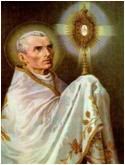 ST. PIERRE JULIEN EYMARD (France, 1811-1868)
ST. PIERRE JULIEN EYMARD (France, 1811-1868)
Founder, Congregation of the Blessed Sacrament
'Apostle of the Eucharist'
No OR today.
No papal events scheduled today.
[Modificato da TERESA BENEDETTA 04/08/2009 03:25] |
| |
 04/08/2009 02:59 04/08/2009 02:59 |
|
| | | OFFLINE | | Post: 18.083
Post: 743 | Registrato il: 28/08/2005
Registrato il: 20/01/2009 | Administratore | Utente Senior | |
|
 Pope Benedict says
Pope Benedict says
music is indestructible
and a taste of Paradise

On Sunday night (8/2) at 6. p.m. the Bavarian Chamber Orchestra of Bad Brueckenau presented a concert in honor of Pope Benedict XVI at the inner courtyard of the Apostolic Palace in Castel Gandolfo.
The program consisted of Benjamin Britten's A Simple Symphony, op. 4, Johann Sebastian Bach's Concerto for Oboe and Strings, BWV 1055; and Mozart's Concerta for Oboe and Orchestra, KV 314.
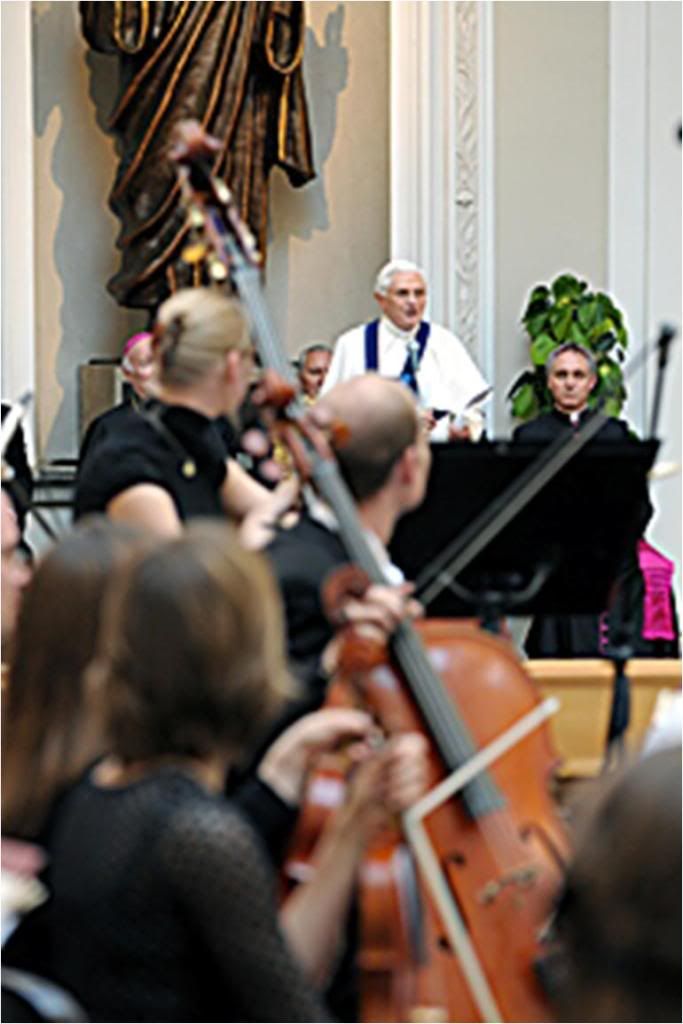
Here is a translation of the Holy Father's remarks, most of it delivered in German:
Honorable Dean Kemmer,
Distinguished musicians,
Dear friends:
Today for the first time, after such a beautiful concert, I am unable to applaud vigorously. I am therefore even happier to be able to express to Mr. Albrecht Mayer and the musicians of the Bayerischen Kammerorchester Bad Brückenau the gratitude and admiration of everyone present.
In the same way I thank Dean Cilian Kemmer for his words of greeting and all those who organized and made this concert in Castel Gandolfo possible. For me, of course, the great fascination of this evening was the sound of the oboe which you, dear Mr. Mayer, masterully offered us .
It was moving to note how from this piece of wood, this instrument, an entire cosmos of music can stream forth: the unfathomable and the joyous, the serious and the facetious, grandeur and humility, the interior dialog of melodies.
I thought how great it is that a small creative piece can hide such promise that a master can liberate. And this means that all creation is full of promises, and that man receives the gift to leaf through the pages of this book of promises at least for some time.
I think this evening invites us not only to avail of the natural forces which help us to bring forth those physical energies which are a promise of creation, but also to avail of the deeper greater promises that this music has shown us, in the vigilance of the heart which allows us to understand even this piece of creation.
The printed program with the description of the music has introduced us to some of the works of the composers. I think it is very moving for us that these masters acted like the good father of the family in the Bible that the Lord speaks of:
Not only do they bring us what is old and new from their treasures, but under the impulse of their tasks, they are capable not only of creating ever new things, but also to reconsider the old and therefore make visible their new potential which was present in the previous work.
This concert with the oboe solos has carried out the task of expressing new potentialities, in which the music develops, remains alive and is reborn in every execution, as it did tonight.
I am reminded that today, the Church marks the day of the Porziuncola indulgence, which reminds us of the miraculous vision of St. Francis. In the small church of the Porziuncola in Assisi, he saw the Lord, his Mother and the angels around them.
The Lord allowed him to express one desire, and St. Francis asked to be able to bring forgiveness home. The request was accepted, he went back home, and told his brothers joyously: "Friends, the Lord wants you all in Paraadise!"
Tonight, I think that we should experience this moment like an hour in Paradise, observing and listening in Paradise, to the uncorrupted beauty and goodness of Creation. Not as an escape from the misery of this world and of daily life, because we must continue to oppose evil and shadows, but only if we ourselves believe in goodness. And we can believe in goodness only if we experience and live it as reality.
Tonight, we touched the good and the beautiful with our hearts.
He concluded in Italian:
Dear friends,
I spoke in German because the musicians and most of the participants are German. Unfortunately, after what happened in the tower of Babel, the languages became separate and create barriers.
But tonight, we have seen and heard that there is an indestructible part of the world - even after the tower and the arrogance of Babel - and it is music: the language that we can all understand because it touches the hearts of everyone.
For us, music is not just a guarantee that the goodness and beauty of God's creation are indestructible, but that we are called and are capable of working for the good and the beautiful, which are also a promise that a future will come when God triumphs, when beauty and goodness will win.
For such consolation, for this comfort in our daily lives, we are grateful to you, the musicians. Thank you to everyone. Good night and have a good week.
P.S. I suppose the Holy Father was thinking of the treasury of Church Tradition which ie perpetually renewed and the discontinuities promoted by the progressivists - while also addressing himself to traditionalists - when he said this:
Not only do they bring us what is old and new from their treasures, but under the impulse of their tasks, they are capable not only of creating ever new things, but also to reconsider the old and therefore make visible their new potential which was present in the previous work.
P.P.S. Pretty soon, someone will (and should) come up with a book on Joseph Ratzinger/Benedict XVI as art critic.
To balance the music part of it, someone should look for any 'reviews' or statements he has made about literary masterpieces. He has cited Dante quite often, and Goethe, too. And in one of his interview books, he said something about why Herman Hesse's Steppenwolf was his favorite novel (which surprised me because if he likes Hesse, I would have thought he would prefer Magister Ludi (literally, master of the games, published in English as The Glass Bead Game). And of course, he 'reviewed' John Paul II's book of poems Roman Triptych. And recently, he commented on the Michelangelo murals in the newly-restored Pauline Chapel.
[Modificato da TERESA BENEDETTA 04/08/2009 13:57] |
| |
 04/08/2009 05:15 04/08/2009 05:15 |
|
| | | OFFLINE | | Post: 18.086
Post: 746 | Registrato il: 28/08/2005
Registrato il: 20/01/2009 | Administratore | Utente Senior | |
|

 The Holy Father reaches out
The Holy Father reaches out
to Christian victims
of Pakistani Muslim extremists

Here is the text of the telegram Pope Benedict XVI asked the Secretary of State of the Holy See, Cardinal Tarcisio Bertone, to send to the Bishop of Faisalabad, in the wake of deadly anti-Christian violence in Pakistan's Punjab province:
The Most Reverend Joseph Coutts
Bishop of Faisalabad
The Holy Father was deeply grieved to learn of the senseless attack on the Christian community of Gojra City which resulted in the tragic killing of innocent men, women and children, and immense destruction.
He asks you to convey his heartfelt condolences to the families of the victims and to express his solidarity with all who have experienced this wanton act.
At the same time His Holiness charges you strongly to encourage the whole diocesan community, and all Christians in Pakistan, not to be deterred in their efforts to help build a society which, with a profound sense of trust in religious and human values, is marked by mutual respect among all its members.
In the name of God he appeals to everyone to renounce the way of violence which causes so much suffering and to embrace the way of peace.
To the families and to all who mourn their dead in faith and in the hope which draws its certainty from the resurrection, the Holy Father cordially imparts his Apostolic Blessing as a pledge of consolation and strength in the Lord.
Cardinal Tarcisio Bertone
Secretary of State
 |
| |
 04/08/2009 13:52 04/08/2009 13:52 |
|
| | | OFFLINE | | Post: 18.089
Post: 749 | Registrato il: 28/08/2005
Registrato il: 20/01/2009 | Administratore | Utente Senior | |
|

Tuesday, August 4
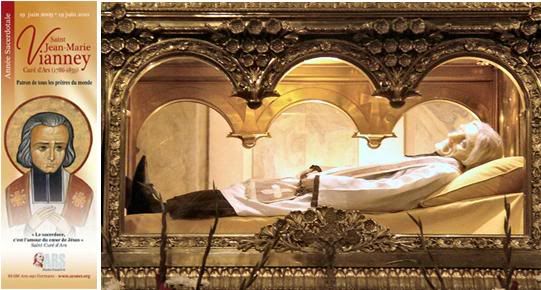 Illustration: Left, Shrine of Ars poster for 150th anniversary of the saint's death;
Illustration: Left, Shrine of Ars poster for 150th anniversary of the saint's death;
right, the saint's incorrupt body in Ars.
ST. JEAN-BAPTISTE MARIE VIANNEY (France, 1786-1859)
Patron Saint of Priests
OR for 8/3-8/4/09:
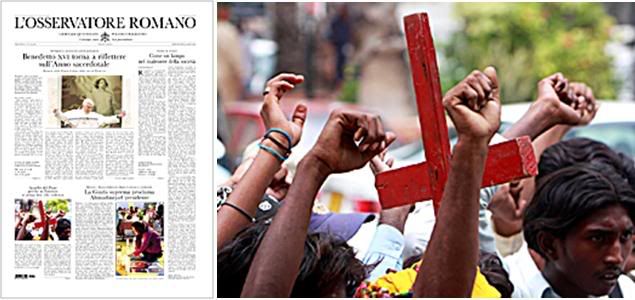

At the Angelus, remembering the saints commemorated these days:
Benedict XVI reflects anew on the Year for Priests
Other Page 1 stories: The Pope appeals for an end to anti-Christian violence in Pakistan; an editorial commentary on Caritas in veritate from the French Minister of Labor; Ahmadinejad proclaimed President by Iran's governing council of mullahs. The inside pages also contain the text of the Pope's remarks after the concert in Castel Gandolfo (right photo, above).
No public events scheduled for the Holy Father today.
In Ars, the Prefect of the Congregation for the Clergy, Cardinal Claudio Hummes,
celebrated the Commemorative Mass on the liturgical feast today of St. Jean Vianney,
in representation of Pope Benedict XVI. News reports and photo coverage of
the celebration in Ars today have been posted in the CHURCH&VATICAN thread.
[Modificato da TERESA BENEDETTA 05/08/2009 18:57] |
| |
 05/08/2009 12:52 05/08/2009 12:52 |
|
| | | OFFLINE | | Post: 18.095
Post: 755 | Registrato il: 28/08/2005
Registrato il: 20/01/2009 | Administratore | Utente Senior | |
|

August 5, Wednesday
 Dedication of the Basilica of Santa Maria Maggiore
Dedication of the Basilica of Santa Maria Maggiore
Commemorates the date in 352 AD when Mary appeared to a Roman couple in a dream and told them to build a church on the Esquiline Hill
where they would find a patch of snow even if it was mid-August. Pope Liberius had the same dream and ordered the church built. Subsequently,
it was enlarged and Santa Maria Maggiore is now the largest Marian shrine in the world. The image venerated there is the Salus Popoli Romani
(Mary, Health of the Roman People), left photo, traditionally said to be one of the Marian images painted by St. Luke. (Right photo is a contemporary
image of Our Lady of the Snow).
OR today.
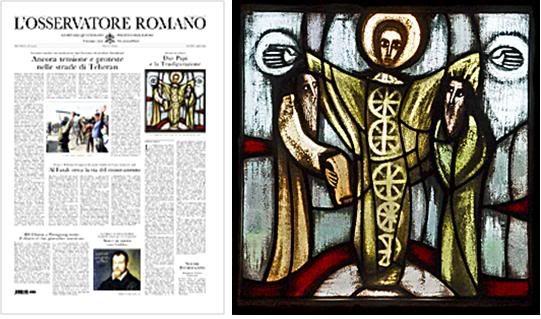 Illustration: Stained-glass window, Church of the Transfiguration, Taize, France.
No papal stories in this issue. A front page commentary considers the Feast of the Transfiguration
Illustration: Stained-glass window, Church of the Transfiguration, Taize, France.
No papal stories in this issue. A front page commentary considers the Feast of the Transfiguration
tomorrow, relating it to Pope Paul VI who died on this feast day 31 years ago, and to Pope Benedict XVI
for his Caritas in veritate. Page 1 international news: More tension and protests on the streets
of Tehran; Arafat's Fatah party in Palestine meets in Bethlehem, seeking a renewal under Palestinian
Authority president Abu Mazen; and Bill Clinton in Pyongyang to obtain the release of two American
female journalists convicted as spies. In the inside pages, a long article spells out the Church's position
on stem-cell research under the title "This is not Galileo all over'.
THE POPE'S DAY
Ge neral Audience today - As he announced Sunday, the Holy Father dedicated his catechesis today
to St. Jean-Baptiste Marie Vianney, the Cure of Ars, whose feast day was yesterday, the anniversary
of his death 150 years ago, which the Church is celebrating as a Jubilee Year for Priests.
[Modificato da TERESA BENEDETTA 05/08/2009 13:05] |
| |
 05/08/2009 14:25 05/08/2009 14:25 |
|
| | | OFFLINE | | Post: 18.096
Post: 756 | Registrato il: 28/08/2005
Registrato il: 20/01/2009 | Administratore | Utente Senior | |
|
 GENERAL AUDIENCE TODAY
GENERAL AUDIENCE TODAY
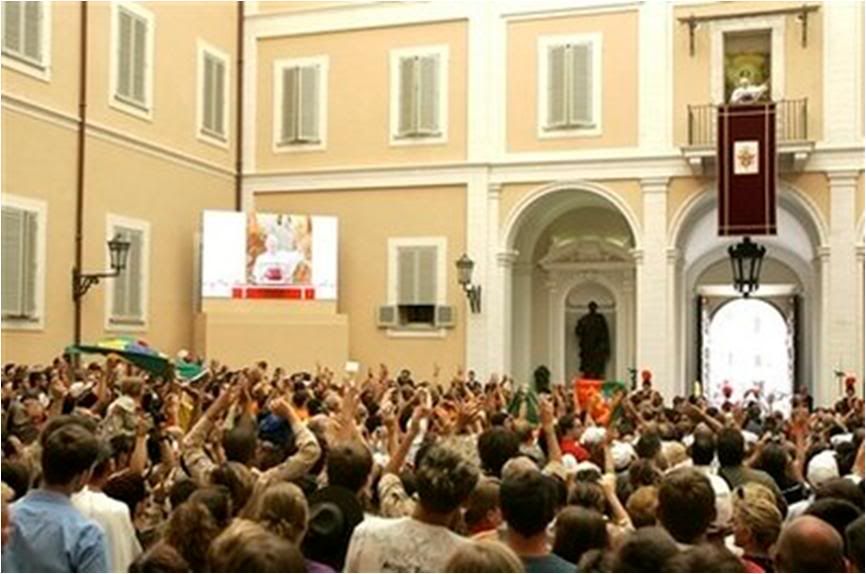
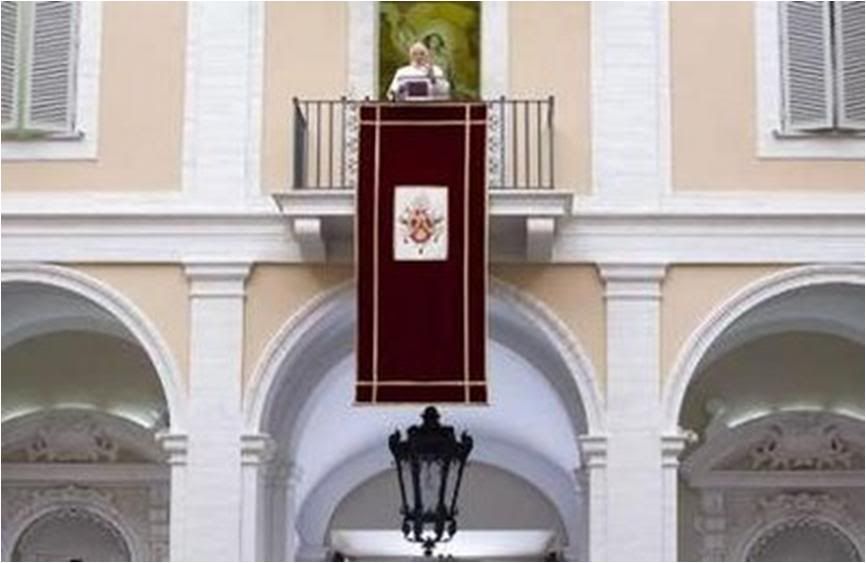
The Holy Father today resumed the Wednesday General Audiences which were not held in July. He held the audience in teh inner courtyard of the Apostolic Palace in Castel Gandolfo.
As he announced last Sunday, he devoted today's catechesis to St. Jean-Baptiste Marie Vianney, the Holy Cure d'Ars, in whose honor he decreed a Year for Priests.
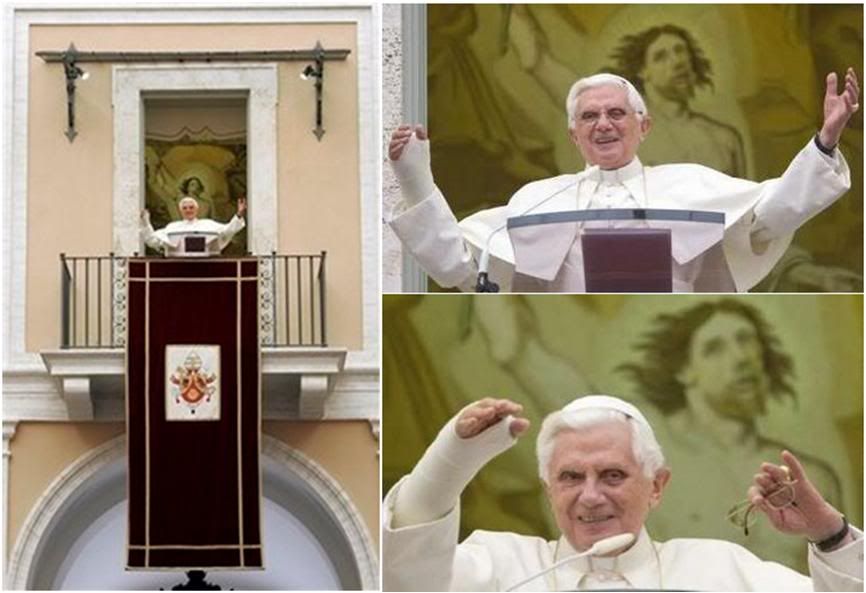
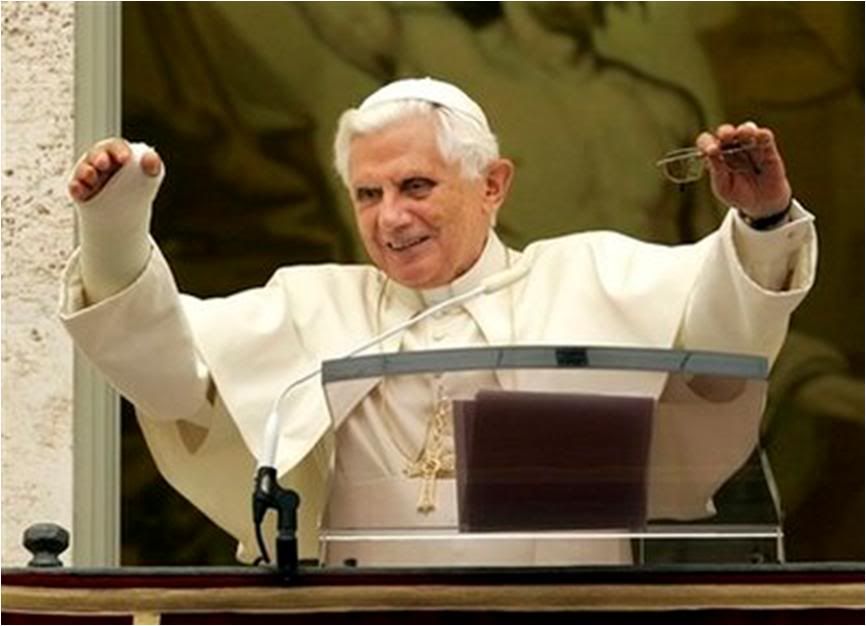
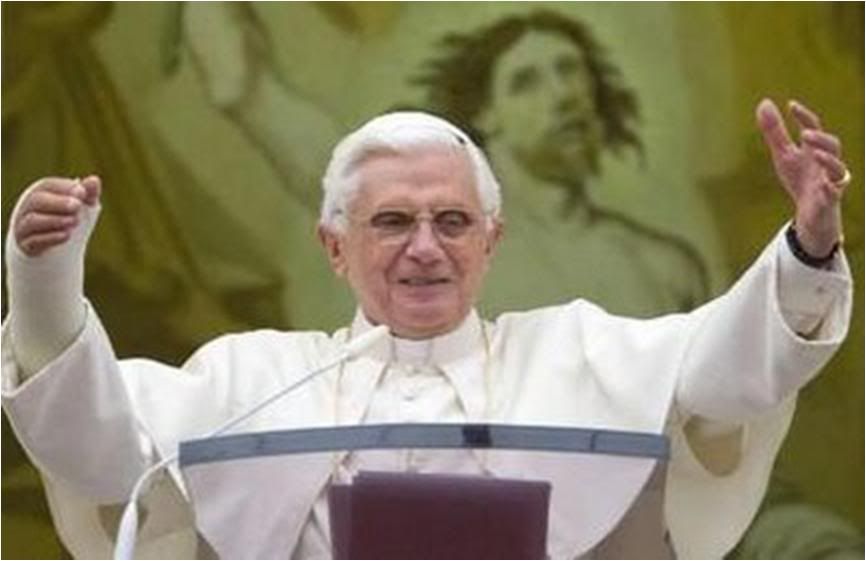
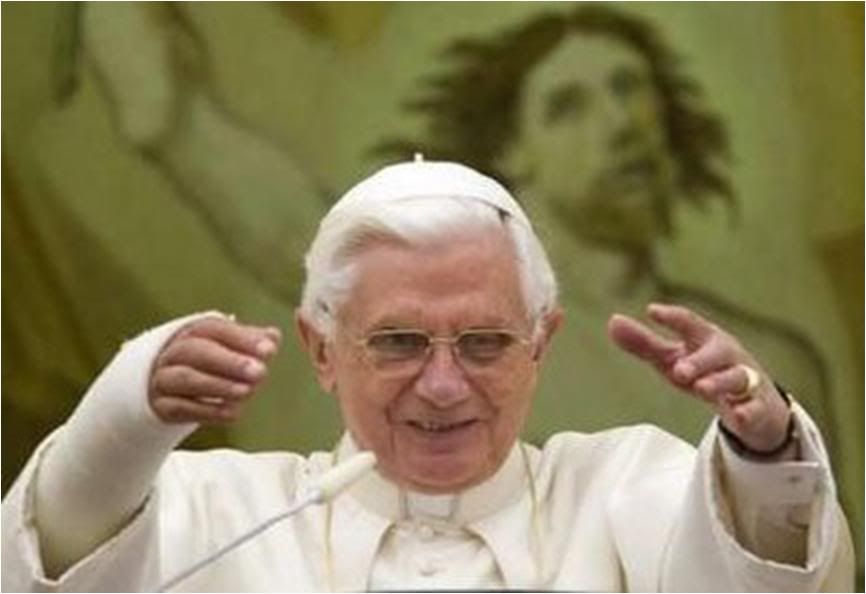 CATECHESIS ON
CATECHESIS ON
ST. JEAN-BAPTISTE MARIE VIANNEY
Here is a full translation of the Holy Father's catechesis today:
Dear brothers and sisters,
In today's catechesis, I wish to review briefly the life of the Holy Curate of Ars, underscoring some traits which can be an example for the priests of our time, certainly very different from those in which he lived, but marked in many ways by the same fundamental human and spiritual challenges.
Yesterday was 150 years since his birth in heaven. Indeed, at 2 a.m. on August 4, 1859, St. Jean-Baptiste Marie Vianney, having ended his earthly existence, went forth to the heavenly father to receive his legacy, the Kingdom prepared since the creation of the world for those who faithfully follow the teachings of God (cfr Mt 25,34).
What a great feast it must have been in Paradise at the arrival of such a zealous pastor! What a welcome must have been given him, by the multitudes of children who had reconciled with the Father, for his work as parish priest and confessor!
I wished to take the occasion of this anniversary to declare a Year for Priests which, as you know, has the theme "Faithfulness to Christ, faithfulness of priests".
Holiness determines the credibility of [Christian] testimony and thus, in a decisive manner, the efficacy itself of the mission of every priest.
Jean Marie Vianney was born in the tiny village of Dardilly on May 8, 1786 to a peasant family, poor in material goods but rich in humanity adn faith. Baptized on the day he was born, as was the custom in those days, he dedicated the years of his childhood and adolescence to working in the fields and pasturing animals, such that at the age of 17, he was still illiterate.
But he knew from memory the prayers taught to him by his pious mother and he was nourished by the religious atmosphere he breathed at home. His biographers narrate that from his infancy, he sought to conform himself to the divine will even in the humblest of tasks.
He nourished in his soul the desire to become a priest but it was not easy for him to do so. In fact, he eventually came to his priestly ordination, after not a few travails and misunderstandings - thanks to the help of wise priests who did not consider only his human limitations but knew how to look beyond them, to see the horizon of holiness in that truly singular young man.
Thus, on June 23, 1815, he was ordained a deacon, and on the following August 13, a priest. Finally, at age 29, after so many uncertainties, not a few failures and so many tears, he could walk up to the altar of the Lord and realize his life's dream.
The Holy Curate of Ars always showed the highest consideration for the gift he had received. "Oh, what a great thing priesthood is! It will not be understood well except in heaven... (because) if it could be understood on earth, one would die - not of fright but of love" (Abbé Monnin, Esprit du Curé d’Ars, p. 113).
As a child, he had confided to his mother: "When I become a priest, I would like to conquer many souls" (Abbé Monnin, Procès de l’ordinaire, p. 1064). And so he did.
In his pastoral service, which was as simple as it was extraordinarily fecund, this anonymous parish priest of a backwoods village in the south of France succeeded so well in identifying himself with his ministry, that he became - in a way that was visible and universally recognized - alter Christus (another Christ), the image of the Good Shepherd, who unlike a hireling, would give his life for his own sheep (cfr Jn 10,11).
Following the example of the Good Shepherd, he gave his life for his flock in the decades of his priestly service. His existence was a living catechesis, which acquired a most special efficacy when the people saw him celebrate Mass, or pray in adoration before the Tabernacle, or spend many hours at the confessional.
The center of his life was the Eucharist, which he celebrated and adored with devotion and respect.
Another fundamental characteristic of this extraordinary figure of a priest was his assiduous ministry of confession. He recognized in the practice of the sacrament of Penance the logical and natural completion of the priestly ministry, obeying Christ's mandate: "Whose sins you forgive are forgiven them, and whose sins you retain are retained" (cfr Jn 29,23).
Thus St. Jean Marie Vianney distinguished himself as an optimal and tireless confessor and spiritual master. Passing "with a single interior movement from the altar to the confessional" where he spent a great part of his day, he sought in every way - through prayer and persuasive counselling - to make his parishioners rediscover the significance and the beauty of sacramental penitence, showing them that it was an intimate demand of the Eucharistic presence (cfr Letter to priests on the Year for Priests).
The pastoral methods of St. Jean Marie Vianney may appear today to be hardly suitable for our present social and cultural conditions. How in fact can a priest today imitate him in a world that has changes do much?
While it is true that times change and that many charisms are specific to a person, and therefore unrepeatable, there is nonetheless a lifestyle and a fundamental yearning that we all are called on to cultivate.
It is apparent that what made the Curate of Ars holy was his humble faithfulness to the mission to which God had called him - his constant abandon, full of trust, into the hands of Divine Providence.
He succeeded in touching the hearts of people not because of his own human gifts, nor even with the sheer and admirable commitment of his will. He conquered souls, even the most refractory, by communicating to them what he intimately lived - his friendship with Christ.
He was 'enamoured' of Christ, and the true secret of his pastoral success was the love that he had for the Eucharistic mystery that he announced, celebrated and lived, which became love for the flock of Christ, for Christians and all persons who seek God.
His witness reminds us, dear brothers and sisters, that for every baptized person - and more so for every priest - the Eucharist is "not simply an event with two protagonists, a dialog between God and myself. Eucharistic Communion leads to a total transformation of one's own life. It opens wide powerfully the entire 'I' of man and creates a new 'we'" (Joseph Ratzinger, Communion in the Church, p. 80).
Therefore, far from reducing the figure of St. Jean Marie Vianney to an example, admirable as it is, of 19th-century denotional spirituality, it is necessary to grasp the prophetic power that mark his human and spiritual personality with the greatest relevance even for our day.
In post-revolutionary France, which experienced a kind of 'dictatorship of rationalism' intended to annul the very presence of priests and of the Church in society, he lived, first of all, during his youth, in heroic clandestinity walking miles at night in order to take part in Holy Mass.
Later, as priest, he distinguished himself by singular and fruitful pastoral creativity, intended to show that the reigning rationalism was in fact far from able to satisfy the authentic needs of man and thus, definitively, not livable.
Dear brothers and sisters, 150 years after the death of the Holy Curate of Ars, the challenges of society today are not any less demanding. Rather, they have perhaps become more complex.
If in his time there was the 'dictatorship of rationalism', in today's age, there is a 'dictatorship of relativism' in many areas.
Both are inadequate responses to man's rightful demand to use his own reason to the full as a distinctive and constitutive element of his own identity.
Rationalism was inadequate because it did not take into account human limitations and claimed to elevate reason alone as the measure for all things, transforming it into a goddess.
Contemporary relativism diminishes reason because it has come to affirm that the human being can know nothing with certainty beyond what science can know positively.
But today, like then, the man "who is a mendicant for meaning and fulfillment" is in constant search for exhaustive answers to the fundamental questions that present themselves ceaselessly.
The fathers of the Second Vatican Council had this 'thirst for truth' which burns in the heart of every man, well in mind when they affirmed that it falls on priests, 'as educators in the faith' to form 'an authentic Christian community' that is capable of opening "to all men the road which leads to Christ' and to exercise 'true maternal action' towards them, indicating and facilitating to non-believers 'stimulus, nourishment and support in the spiritual struggle' (cfr Presbyterorum ordinis, 6).
The teaching that the Holy Curate of Ars continues to transmit to us in this regard is that, at the basis of such pastoral commitment, the priest should have an intimate personal union with Christ, one that he must cultivate and grow day after day.
Only when he is enamoured of Christ can the priest teach this union to others, this intimate friendship with the divine Teacher. Only then can he touch the hearts of men and open them to the merciful love of the Lord.
Consequently, only then can the priest infuse enthusiasm and spiritual vitality into the communities which the Lord entrusts to him.
Let us pray that, through the intercession of St. Jean Marie Vianney, the Lord may give his Church holy priests, and that the desire to sustain and aid their ministry may grow in the hearts of the faithful.
Let us entrust these intentions to Mary, whom we invoke today as Our Lady of the Snow.
In English, he said:
I offer a warm welcome to the English-speaking visitors present at today’s Audience, especially the pilgrimage groups from England, China, Korea and the United States of America.
Yesterday the Church celebrated the one hundred and fiftieth anniversary of the death of Saint John Vianney, the Curé of Ars, who is the patron saint of parish priests.
In this Year for Priests, let us pray that through his intercession all priests will be renewed in love of the Lord, in the joyful pursuit of holiness and in generous commitment to the spread of the Gospel.
Upon you and your families I invoke God’s blessings of joy and peace!
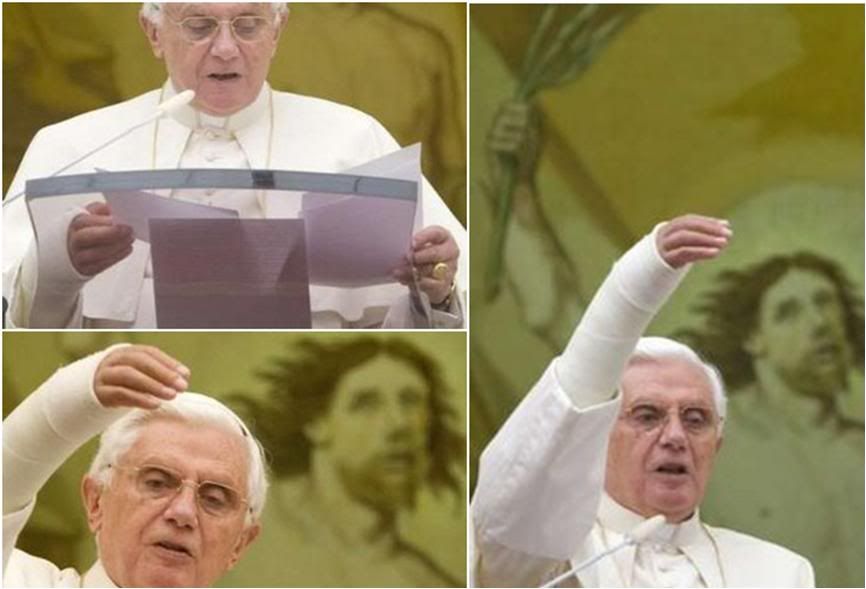
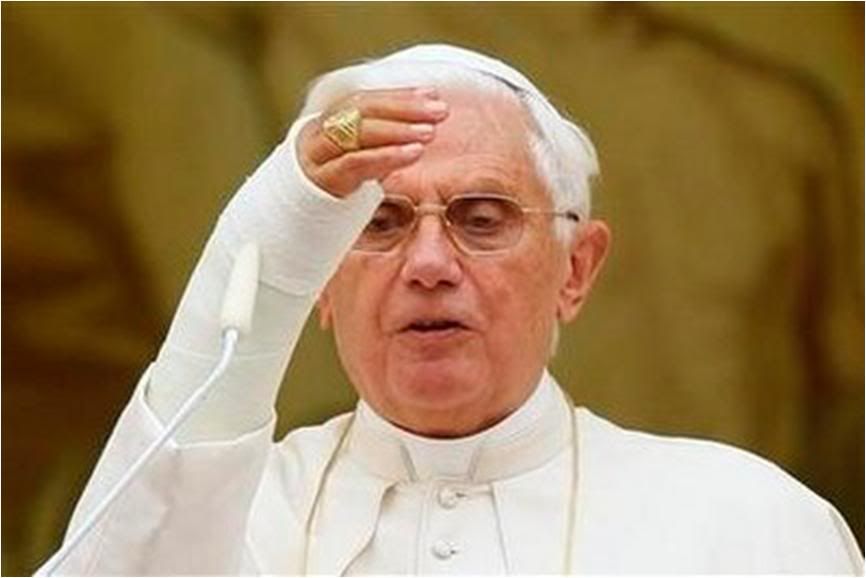 L'Osservatore Romano in its issue tomorrow (8/6) carries these pictures showing the Holy Father greeting the overflow crowd at the GA today, who gathered in the town square in front of the Apostolic Palace at Castel Gandolfo.
L'Osservatore Romano in its issue tomorrow (8/6) carries these pictures showing the Holy Father greeting the overflow crowd at the GA today, who gathered in the town square in front of the Apostolic Palace at Castel Gandolfo.
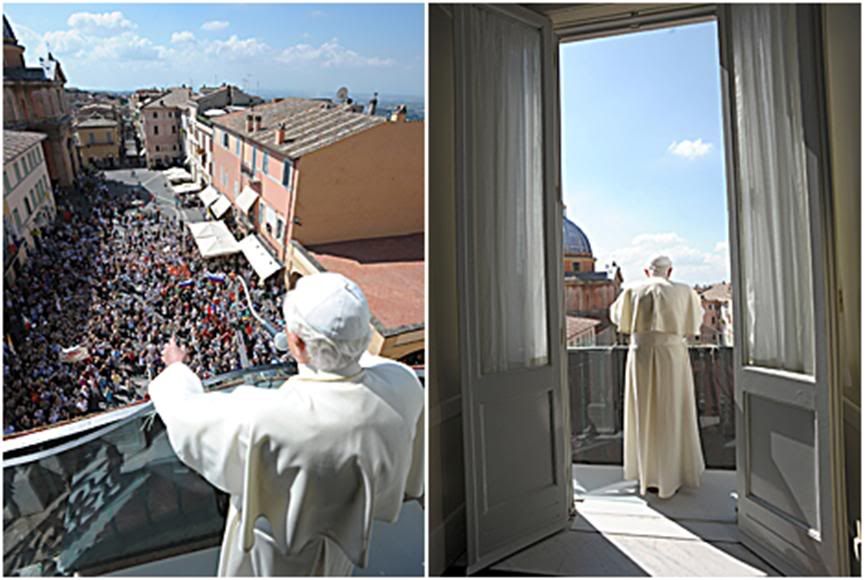
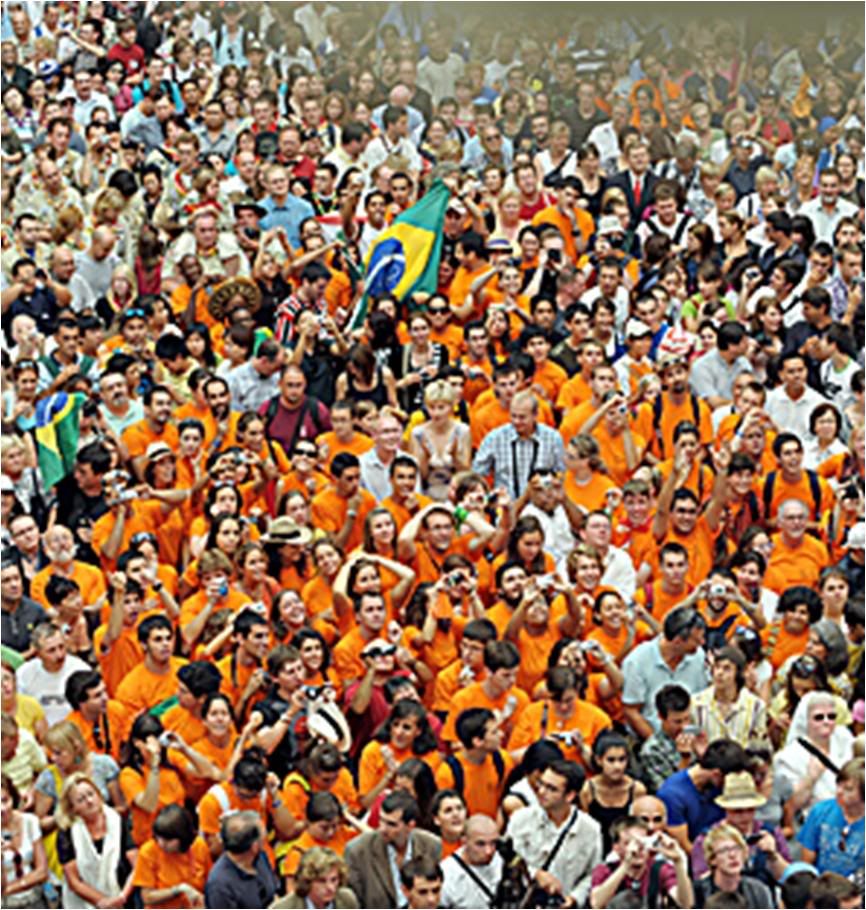
[Modificato da TERESA BENEDETTA 06/08/2009 20:43] |
| |
 06/08/2009 13:35 06/08/2009 13:35 |
|
| | | OFFLINE | | Post: 18.099
Post: 759 | Registrato il: 28/08/2005
Registrato il: 20/01/2009 | Administratore | Utente Senior | |
|
 A welcome commentary on what I have previously deplored as thoughtless and erroneous labelling of the Pope - such as even someone like John Allen habitually does - for his integral Christian ecology.
The not-so-green Pope
A welcome commentary on what I have previously deplored as thoughtless and erroneous labelling of the Pope - such as even someone like John Allen habitually does - for his integral Christian ecology.
The not-so-green Pope
by Samuel Gregg D.Phil.
 'Bringing moral reflection to bear upon current events'
'Bringing moral reflection to bear upon current events'
August 5, 2009
“The Green Pope.” Ever since Joseph Ratzinger’s election as Pope in 2005, this has been a popular description of Benedict XVI.
It’s partly fueled by events such as the Vatican City State adopting solar power paneling, and, more significantly, Benedict’s discussion of environmental questions in several papal documents.
The label will proliferate following the recent announcement that the Pope’s 2010 World Day of Peace message will focus on the connection between peace and respect for God’s creation.
The problem, however, is that the present hype about “the greenest Pope in history” — to cite another headline — is misleading. A somewhat different picture emerges from careful analysis of Benedict’s formal pronouncements on environmental matters.
These quickly demonstrate that Benedict’s attention to environmental subjects is grounded, unsurprisingly, in a very orthodox Christian theological analysis. Indeed, it sometimes generates hard questions about many contemporary environmentalists’ priorities and philosophical assumptions.
Exhibit A is Benedict’s recent social encyclical Caritas in Veritate. The text is replete with warnings about real and potential environmental degradation. Yet it also makes points impossible to reconcile with much contemporary environmental thinking.
No one should be surprised that Benedict insists that people are intrinsically more valuable than nature – a point disputed by some Green-leaning philosophers.
Nor should we be shocked to discover that Benedict describes positions that question humanity’s innate superiority to the natural world as facilitating “attitudes of neo-paganism or a new pantheism” (CV 48).
In this connection, it’s worth underscoring Caritas in Veritate’s extensive disputation of the “population-growth-is-evil” thesis (CV 44).
Population alarmism has been a staple ingredient of much environmentalist ideology ever since Paul Ehrlich’s infamous 1968 book, The Population Bomb, predicted (wrongly) that “in the 1970s and 1980s hundreds of millions of people will starve to death” and enormous environmental damage would flow from millions futilely trying to feed themselves.
The dominant theological lens through which Caritas in Veritate views environmental concerns is that of stewardship. Stewardship concerns humans protecting and cultivating nature for their own and God’s purposes, and even using new technologies to enhance nature’s ability to serve us (CV 50).
In short, nature is neither to be deified nor arbitrarily exploited. That’s a Jewish and Christian motif as old as the Book of Genesis itself.
Also telling is Benedict’s insistence upon a holistic understanding of what we mean by the word ecology.
“The book of nature”, Benedict insists, “is one and indivisible: it takes in not only the environment but also life, sexuality, marriage, the family, social relations” (CV 51).
In other writings, Benedict highlights the incongruity of people being outraged about wanton environmental destruction, while ignoring or even promoting the deep damage done by ethical relativism to society’s moral ecology.
Incidentally, the phrases “climate change” or “global warming” appear nowhere in Caritas in Veritate. Again, this is not surprising. Benedict has been careful not to prejudge the science of this complex subject.
In his 2008 World Day of Peace message, Benedict observed that in thinking through environmental problems, “It is important for assessments...to be carried out prudently, in dialogue with experts and people of wisdom, uninhibited by ideological pressure to draw hasty conclusions.”
As someone who has labored ceaselessly for the priority of truth over ideology, Benedict knows that neither international organizations nor public opinion determine the truth about climate change and its causes.
That’s a question for science, and many reputable scientists dispute aspects of the prevailing tenets of climate change to which some environmentalists seem religiously wedded.
The most recent such example to surface is the internationally renowned Australian geologist Professor Ian Plimer (who, incidentally, is also a fierce critic of creationism). His Heaven and Earth (2009) argues that climate change has little if anything to do with man-made greenhouse gases. The book is making intellectual waves across the globe, selling 30,000 copies in its first month.
Plimer’s meticulous analysis of the facts has also impressed prominent Catholic clergy such as Cardinal George Pell of Sydney.
Neither Plimer nor Pell are climate change deniers. They do, however, question conventional perceptions about its causes.
They also consider as positively harmful to the cause of scientific truth the thuggish tactics (such as starving climate-skeptics of funding) employed by some politicians, environmentalists and academics to try to terminate any debate.
As anyone who has studied his life and thought knows, Joseph Ratzinger has never been intimidated by political correctness. Certainly Benedict affirms our greater sensitivity to the environment’s fragility and the ongoing necessity for orthodox Christian theological reflection upon man’s relationship with the natural world.
But Benedict does not make the mistake of romanticizing nature, which can, after all, be very cruel. Nor is he afraid to underline the dark, anti-human side to much Green ideology.
In this regard, Benedict’s “greenness” turns out to be rather pale.
|
| |
 06/08/2009 14:09 06/08/2009 14:09 |
|
| | | OFFLINE | | Post: 18.100
Post: 760 | Registrato il: 28/08/2005
Registrato il: 20/01/2009 | Administratore | Utente Senior | |
|

Thursday, August 6
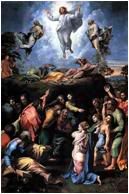 THE TRANSFIGURATION
THE TRANSFIGURATION
Raphael, 1516-1520, Vatican Museums
OR today.
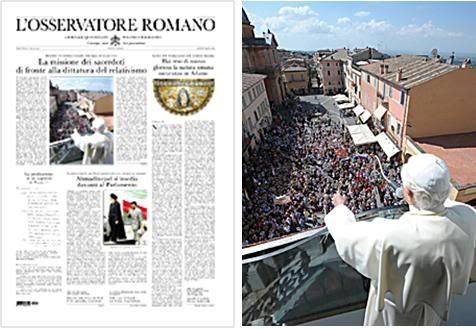 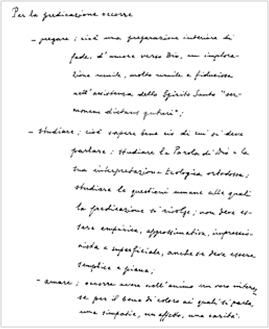
At the General Audience, b\Benedict XVI underscores the present relevance of the Cure d'Ars:
The mission of priests in the face of the 'dictatorship of relativism'
Other Page 1 stories: An essay on the Feast of the Transfiguration in the Byzantine tradition; and newly released archival material
shows a 1969 handwritten note by Paul VI that preaching requires 'prayer, study and love'. And in secular news, Ahmadinejad
is sworn in for his second term as President of Iran.
No scheduled events for the Holy Father today.
|
| |
|
|
|
|